 29/04/2010 18:25 29/04/2010 18:25 |
|
| | | OFFLINE | | Post: 20.063
Post: 2.704 | Registrato il: 28/08/2005
Registrato il: 20/01/2009 | Administratore | Utente Veteran | |
|


 See preceding page for earlier entries today, 4/29/10.
See preceding page for earlier entries today, 4/29/10.

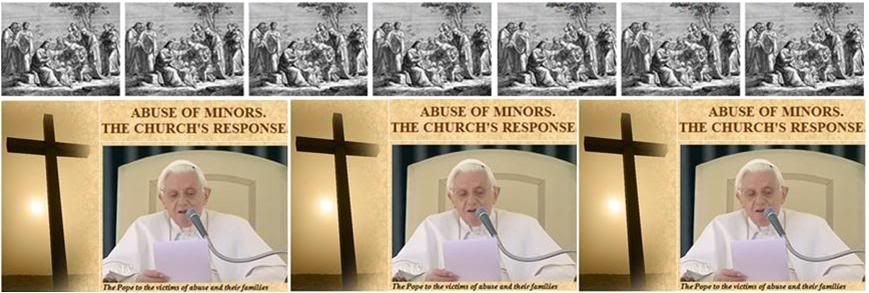 The British newspaper Independent first 'speculated' about this on April 25 (posted in the preceding page of this thread), but AP has picked it up from an interview given by Cardinal Levada who says exactly one sentence about it - "He may or he may not..." But the news report is worthwhile for the other things Levada said about applying the norms adopted by the US Church in other countries.... As usual, in the process, we have to bear with the AP's malicious commonplaces...
Vatican: the Pope may apologize
The British newspaper Independent first 'speculated' about this on April 25 (posted in the preceding page of this thread), but AP has picked it up from an interview given by Cardinal Levada who says exactly one sentence about it - "He may or he may not..." But the news report is worthwhile for the other things Levada said about applying the norms adopted by the US Church in other countries.... As usual, in the process, we have to bear with the AP's malicious commonplaces...
Vatican: the Pope may apologize
for abuse by priests
By NICOLE WINFIELD

VATICAN CITY, April 28 (AP) – Pope Benedict XVI may issue a mea culpa for the Church's handling of clerical sexual abuse cases when he attends a meeting of the world's clergy in June, the Vatican official in charge of handling abuse cases said.
Cardinal William Levada also said he intended to hold up the U.S. policy dealing with abuse as a model for bishops around the word.
Levada, head of the Congregation for the Doctrine of the Faith, made the comments in an interview broadcast late Tuesday on U.S. public broadcaster PBS, his first interview since the scandal erupted several weeks ago.
"It's a big crisis. I think no one should try to diminish that," Levada said. He acknowledged that the Vatican was caught by surprise, even though it was well aware of the scope of the U.S. and Irish crises, and blamed "a certain media bias" for keeping the story alive.
As the scandal has raged around the Vatican, Benedict has come under increasing pressure to admit some form of higher responsibility on the part of the Vatican for fomenting a culture of secrecy that allowed abuse to fester unchecked for decades.
Benedict has expressed his sorrow and shame for the abuse, he has wept with victims and promised new measures to protect children and bring justice to pedophile priests.
But he has admitted no personal or institutional responsibility, blaming instead the abusers themselves and their bishops for mishandling cases when they arose. [This is one of those readymade slugs that the AP now automatically drops into every story about Benedict XVI. Benedict XVI has never cast his denunciations of the evil done by the abusers and some bishops in terms of blame - that is unworthy of a Christian, let alone a Pope! And what personal responsibility should he admit to? As a man of God, as priest and as Pope, he is an honest and truthful man, and if he thought that he had ever been remiss in his duties and responsibilities in this regard, he would have said so without prompting from anyone.]
Italian news reports this week suggested Benedict would use the June 9-11 meeting of the world's priests at the Vatican to issue some form of apology.
The meeting was initially called to simply mark the end of the Vatican's Year of the Priest. A few weeks ago, as Benedict came under fire in the abuse scandal, the meeting's focus shifted and its organizers signaled it would instead be a giant pep rally to show solidarity with the besieged Pontiff.
Now, it appears it will be also be a forum for Benedict to make a strong statement apologizing for abuse. [DUH! It may not necessarily take the grovelling form of apology that MSM has been salivating about, but it doesn't take an Einstein to know that, of course, the Holy Father cannot fail to use the occasion of the concluding events of the Year for Priests to address the issue - directly to those most concerned, not because they bear any responsibility for the sins of their brothers, but to make sure they learn all the lessons that can be drawn from this painful episode, and to encourage them in their difficult but heroic vocation to serve God by serving the Church and the faithful.]
Asked about the reports that a papal mea culpa would be issued, Levada said: "Whether he is going to do that or not we'll have to wait and see, but I wouldn't be surprised."
Levada was more forthcoming about his intention to hold up the U.S. abuse norms as a model for bishops conferences around the world.
The U.S. norms bar credibly accused priests from any public church work while claims against them are under investigation. Diocesan review boards, comprised mostly of lay people, help bishops oversee cases. Clergy found guilty are permanently barred from public ministry and, in some cases, ousted from the priesthood.
The U.S. policy does not specifically order all bishops to notify civil authorities when claims are made. Instead it instructs bishops to comply with state laws for reporting abuse, and to cooperate with authorities. All dioceses were also instructed to advise victims of their right to contact authorities themselves.
It requires dioceses to maintain "safe environment" programs to educate children, parents and priests to keep children safe and prevent abuse.
Levada called the norms a "real success story" that should be a model for others — bishops as well as Boy Scouts and public schools.
"I will look forward to helping my brother bishops around the world see what can be done if you take good concrete steps, put things out on the table, make sure that you've got a program to educate your priests and screen for any problem areas as you are admitting priest and have a good program for safe environment," he said.
"I think that's happened in the United States and it should be something that can be done throughout the church."
Many bishops conferences have norms on the books already; many have said they planned to revise them in the wake of the scandal. Officially speaking, the U.S. Conference of Catholic Bishops says no European bishops conference has asked them for advice; with Levada in Rome, however, that may not come as a surprise.
Even with a Vatican-approved policy on the books, advocates for victims and Church leaders disagree over how closely the U.S. policy has been followed. And even with all the reforms, the American Church is still paying the price for the problem. [Is that a moronic statement or what? Of course, it is still paying the price - for crimes that took place before the reforms !DUH! When you're trying to put in a dig, at least make sure it makes sense!]
American dioceses have paid more than $2.7 billion for settlements and other costs since 1950, according to tallies by the bishops and news reports.
My jaw dropped when I saw the following headline in the Yahoo news summary attributed to the National Catholic Reporter... It turns out they are merely using a CNS story about the Levada interview... Which is, of course, presented without the AP bias.
Pope sets example
in meeting with abuse victims
By Carol Glatz

VATICAN CITY, April 29 (CNS) -- Bishops worldwide are encouraged to meet with victims of clerical sex abuse, just as Pope Benedict XVI has done, said the prefect of the Congregation for the Doctrine of the Faith.
"There is nothing that helps bishops or priests learn about this problem better than meeting with the victims and hearing their stories," U.S. Cardinal William J. Levada said in a televised interview April 27.
Pope Benedict XVI has met with victims several times, and "that's an example to bishops," he said.
The interview, which took place in the cardinal's Vatican office, aired on PBS' "The NewsHour with Jim Lehrer," and was to be one of a series of reports from the Vatican.
In the 14-minute interview, Cardinal Levada said he didn't want to "scapegoat anybody or have a conspiracy theory," but he thought there has been "a certain media bias" in the way media outlets have covered the sex abuse scandals.
Reports, especially by U.S. media, have largely relied on information coming from attorneys representing alleged abuse victims and, because of that, "have not been fair in giving a balanced picture, a picture in context," he said.
He said more media attention should be paid to the positive steps the Church in the United States has taken to address its own sex abuse scandals.
The U.S. bishops in 2002 adopted landmark policies to address and prevent child sex abuse, which included the "Charter for the Protection of Children and Young People."
The cardinal said the Vatican-approved U.S. programs are "a real success story" that should serve as a model for other bishops' conferences as well as for public schools and organizations that work with children.
The U.S. bishops took "very concrete action" and "I think that the United States can rightly offer a model," he said.
He said that while sex abuse occurs in other environments, members of the Church "should hold ourselves to a higher standard, in the sense that this is not something that one would have expected" because a priest is ordained to be a good shepherd of his flock."
Concerning the recent resignation of bishops over their handling of sex abuse cases, Cardinal Levada said he would not be surprised if there were more resignations to follow. He said the standard by which bishops are expected to address clerical sex abuse is "not new, but it's being applied more rigorously than in the past."
"I will look forward to helping my brother bishops around the world see what can be done if you take good concrete steps, put things out on the table, make sure that you've got a program to educate your priests and screen for any problem areas as you are admitting priests and have a good program for (a) safe environment," he said.
"I think those are key things that make our people feel secure" and such procedures "should be something that can be done throughout the Church," he said.
The Vatican posted online in mid-April a summary of the Vatican's procedures for handling sex abuse allegations against priests, which were adopted in the wake of a 2001 papal document that established strict universal norms for handling such cases and placed these cases under the authority of the Congregation for the Doctrine of the Faith. Almost all MSM stories about thoat layman's guide made it appear as if they were recent, instead of dating back to 2003 to make clear to bishops the key provisions of De delictis gravioribus, Cardinal Ratzinger's 2001 implementing instructions for John Paul II's motu proprio Sacramentorum Santitatis Tutela.
Cardinal Levada said publishing the summary online was done because "it seemed good to put this in writing and at least put it as guidance for bishops", as well as to answer the general public's questions about what the Church's rules were and what bishops were required to do. [What do bishops do when they receive official communications from the Vatican - especially if it has to do with doctrinal clarifications, policies and procedures applicable to the universal Church? One gets the impression that many treated the 2001 Instruction and the simplified 2003 guidelines the same way some of them have dealt with Summorum Pontificum - forget they had ever received it or deliberately ignore what they are told.]
*************************************************************************************************
Note to David: Because of the CNS story on the Levada interview, I decided to move the entire post (ncluding the earlier AP story) forward, so your last post moved back one position to the preceding page.
[Modificato da TERESA BENEDETTA 29/04/2010 18:35] |
| |
|
| |
 29/04/2010 19:02 29/04/2010 19:02 |
|
| | | OFFLINE | | Post: 20.064
Post: 2.705 | Registrato il: 28/08/2005
Registrato il: 20/01/2009 | Administratore | Utente Veteran | |
|

 Pope will make final decision
Pope will make final decision
on Legionaries, Vatican spokesman states

Rome, Italy, Apr 28, 2010 (CNA/EWTN News).- Pope Benedict XVI will make the final decisions regarding the Apostolic Visitation of the Legionaries of Christ, clarified the Vatican spokesman on Wednesday. A meeting between the bishops involved in investigations of the religious congregation will take place in Rome on Friday.
The Apostolic Visitation of the Legionaries was called for by the Holy See in March 2009 and began on July 15. Archbishop of Denver Charles Chaput is among the five bishops from Europe and the Americas responsible for compiling reports for the visitation.
A meeting of the five Apostolic Visitors will take place in the Eternal City on April 30.
Fr. Federico Lombardi explained in a brief message released through Vatican Radio on Wednesday that it will be the Pope who will make any decisions concerning the Legionaries.
The Vatican spokesman told journalists that no specific decisions are expected to result from the encounter this week as the five bishops plan to use the meeting to present their initial reports and proposals.
A decision will come at a later date, after Pope Benedict has had the opportunity to review and reflect on the conclusions of the reports.
Fr. Lombardi added that a statement will follow Friday's meeting.
The five apostolic visitors designated by the Holy Father are: Bishop Ricardo Watti Urquidi of Tepic, Mexico; Archbishop Charles Chaput of Denver, Colorado; Archbishop Ricardo Ezzati Andrello of Concepcion, Chile; Bishop Giuseppe Versaldi of Alejandria, Italy; and Bishop Ricardo Blazquez Perez of Bilbao, Spain.
Each of them is responsible for presenting a report concerning the five distinct geographical areas of the Legionaries' international operations.
Legionaries break silence
ahead of Vatican meeting

VATICAN CITY, April 29 (AP) – The No. 2 official in the Legionaries of Christ has broken his silence on the eve of a Vatican meeting to discuss the fate of the order following revelations that its late founder led a double life.
The Rev. Luis Garza Medina says he only realized the accusations against Rev. Marciel Maciel were true in 2006, when the Vatican ordered the founder to spend the rest of his life in penance and prayer.
It wasn't until March that the Legionaries explicitly acknowledged that Maciel had sexually abused seminarians, fathered a daughter and that two men claimed to be his sons as well.
Garza Medina spoke to Rome daily La Repubblica a day before five Vatican experts were to discuss their investigation of the order with the Vatican secretary of state.
[Modificato da TERESA BENEDETTA 29/04/2010 19:03] |
| |
 29/04/2010 22:28 29/04/2010 22:28 |
|
| | | OFFLINE | | Post: 20.066
Post: 2.707 | Registrato il: 28/08/2005
Registrato il: 20/01/2009 | Administratore | Utente Veteran | |
|
 Pope identifies basic tasks
Pope identifies basic tasks
for bishops of Africa

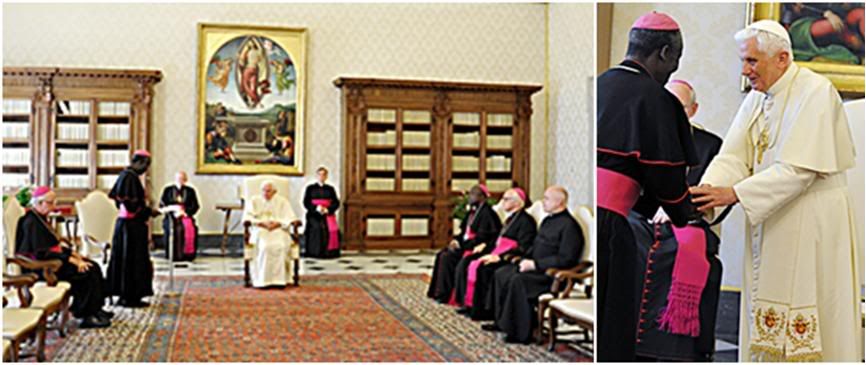
The Holy Father met today with the five bishops of the Episcopal Conference of Liberia-Gambia-Sierra Leone who are completing their ad limina visit to Rome.
He met individually with them earlier this week. This time, he addressed them as a group. Here is the text of his address, delivered in English:
Dear Brother Bishops,
I am pleased to welcome you, the Bishops of Liberia, The Gambia and Sierra Leone on your Ad Limina visit to the tombs of the Apostles Peter and Paul.
I am grateful for the sentiments of communion and affection expressed by Bishop Koroma on your behalf, and I ask you to convey my warm greetings and encouragement to your beloved people as they strive to lead a life worthy of their calling (cf. Eph 4:1).
The Second Special Assembly for Africa of the Synod of Bishops was a rich experience of communion and a providential occasion for renewing your own episcopal ministry and reflecting on its essential task, namely, "to help the People of God to give to the word of revelation the obedience of faith and to embrace fully the teachings of Christ" (Pastores Gregis, 31).
I am pleased to see from your Quinquennial Reports that, while dedicated to the administration of your Dioceses, you personally strive to preach the Gospel at confirmations, in your visits to parishes, when meeting with groups of priests, religious or lay people and in your pastoral letters.
Through your teaching the Lord preserves your people from evil, ignorance and superstition, and transforms them into children of his Kingdom. Strive to build vibrant and expansive communities of men and women strong in their faith, contemplative and joyful in the liturgy, and well instructed on "how to live in the way that pleases God" (1 Th 4:1).
In an environment marked by divorce and polygamy, promote the unity and well-being of the Christian family built on the sacrament of marriage. Initiatives and associations dedicated to the sanctification of this basic community deserve your full support.
Continue to uphold the dignity of women in the context of human rights and defend your people against attempts to introduce an anti-birth mentality disguised as a form of cultural progress (cf. Caritas in Veritate, 28).
Your mission also requires that you give attention to the adequate discernment and preparation of vocations and to the ongoing formation of priests, who are your closest collaborators in the task of evangelization.
Continue to lead them by word and example to be men of prayer, sound and clear in their teaching, mature and respectful in their dealings with others, faithful to their spiritual commitments and strong in compassion towards all in need. Likewise do not hesitate to invite missionaries from other countries to assist the good work being done by your clergy, religious and catechists.
In your countries the Church is held in high regard for her contribution to the good of society especially in education, development and health care, offered to all without distinction. This tribute speaks well of the vitality of your Christian charity, that divine legacy given to the Universal Church by her founder (cf. Caritas in Veritate, 27).
I appreciate in a special way the assistance you offer to refugees and immigrants and I urge you to seek, when possible, pastoral cooperation from their countries of origin.
The struggle against poverty must be carried out with respect for the dignity of all concerned by encouraging them to be the protagonists of their own integral development.
Much good can be done through small-scale community engagements and microeconomic initiatives at the service of families. In developing and sustaining such strategies, improved education will always be a decisive factor.
Hence I encourage you to continue providing school programmes that prepare and motivate new generations to become responsible citizens, socially active for the good of their community and their country.
You rightly encourage people in positions of authority to lead in the struggle against corruption by calling attention to the gravity and injustice of such sins. In this regard, the spiritual and moral formation of lay men and women for leadership, through specialized courses in Catholic Social Doctrine, is an important contribution to the common good.
I commend you for your attention to the great gift which is peace. I pray that the process of reconciliation in justice and truth, which you have rightly supported in the region, may produce lasting respect for all God-given human rights and defuse tendencies to retaliation and vengeance.
In your service to peace continue to promote dialogue with other religions, especially with Islam, so as to sustain the existing good relations and forestall any form of intolerance, injustice or oppression, detrimental to the promotion of mutual trust.
Working together in the defence of life and in the struggle against disease and malnutrition will not fail to build understanding, respect and acceptance. Above all, a climate of dialogue and communion must characterize the local Church.
By your own example, lead your priests, religious and lay faithful to grow in understanding and cooperation, in listening to one another and in sharing initiatives. The Church as the sign and instrument of the one Family of God must bear clear witness to the love of Jesus our Lord and Saviour that extends beyond ethnic frontiers and embraces all men and women.
Dear Brother Bishops, I know that you find inspiration and encouragement in the words of the Risen Christ to his Apostles: "Peace be with you. As the Father has sent me, even so I send you" (Jn 20:21).
On your return home to continue your mission as successors of the Apostles, please convey my affectionate and prayerful good wishes to your priests, religious, catechists and all your beloved people. To each of you, and to those entrusted to your pastoral care, I cordially impart my Apostolic Blessing.
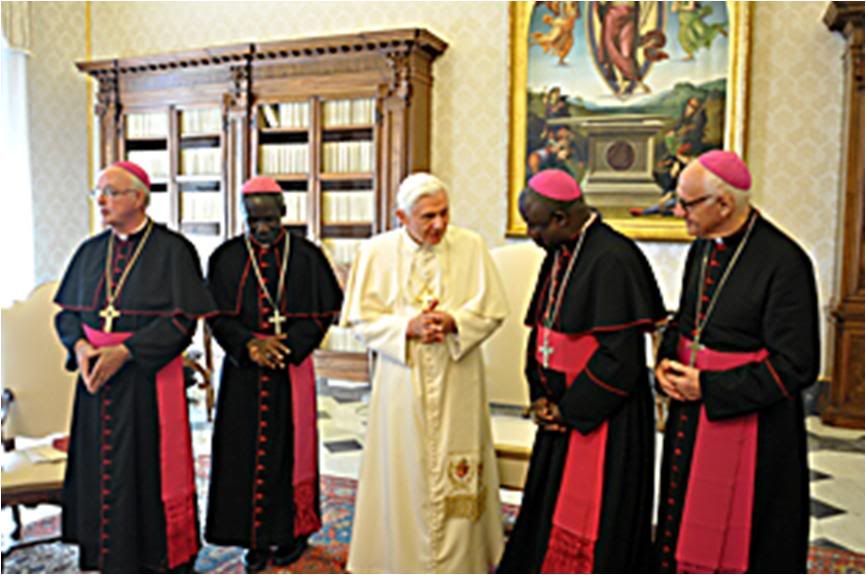
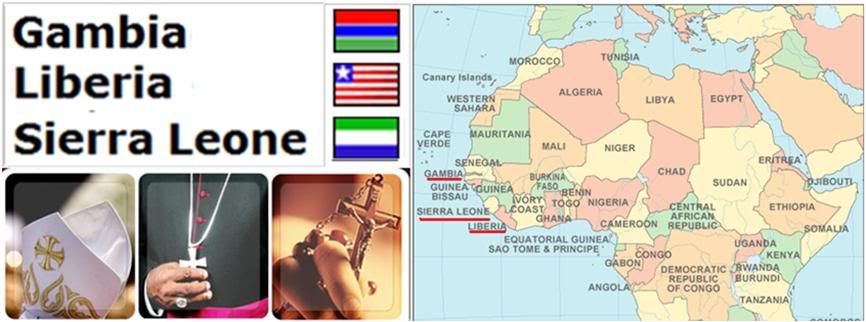 Earlier today, the Holy Father received the credentials of the new ambassador from the Democratic Republic of the Congo.
Pope urges a 'fresh start' on
Earlier today, the Holy Father received the credentials of the new ambassador from the Democratic Republic of the Congo.
Pope urges a 'fresh start' on
the 50th anniversary of Democratic Congo

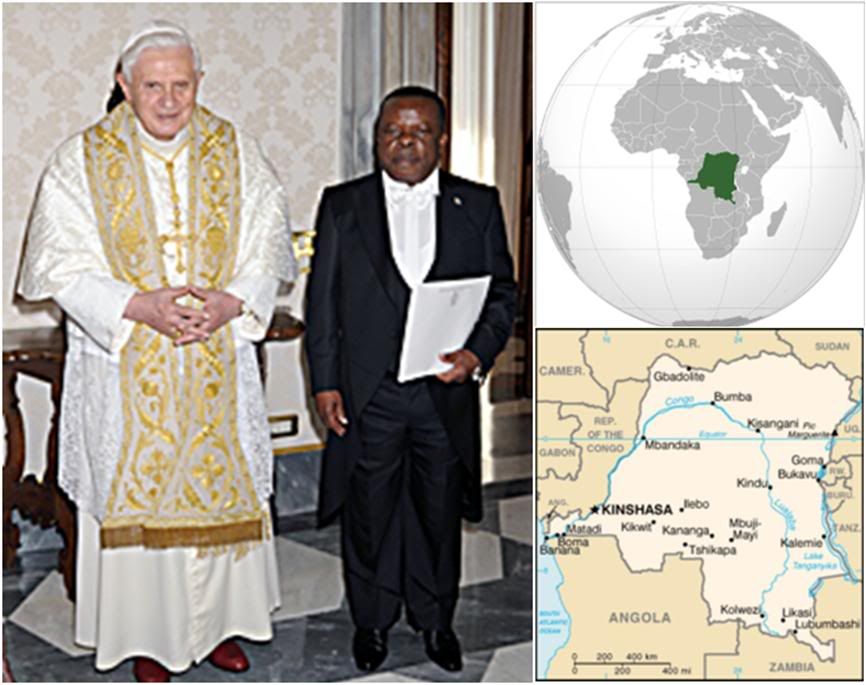
(29 Apr 10 - RV) Pope Benedict XVI on Thursday called on the Democratic Republic of the Congo to make a fresh start as the nation marks the 50th anniversary of its independence.
The Pope was speaking to the new Ambassador from the Congo to the Holy See, Jean-Pierre Hamuli Mupenda, who is the first resident ambassador to the Holy See from the Democratic Republic of the Congo in a number of years.
Pope Benedict told him his arrival reflects the desire of strengthening the relations between the two states.
The Central African country, after throwing off the dictatorship of Joseph Mobutu in 1997, entered into a period of civil wars and violence that it still has not entirely escaped.
About half of the country is Catholic, and Pope Benedict said the Church will continue to contribute to the gradual rebuilding of the the social fabric which has been so badly wounded by the ongoing conflict in the country.
He said the country must encourage and strengthen the family, and work for an integrated Congolese education, which can help the work for justice and peace.
Speaking of the violence so prevalent in the country, the Holy Father said he was particularly concerned about the effect on women and children, whose dignity has been trampled on by the excessive violation of their rights.
Pope Benedict called on the Congo to use all political means to end the human suffering in the country.
He said the Catholic Church will continue to contribute to this task, including with its institutions dedicated to education and healthcare.
{The Pope spoke in French, so I still have to translate it.]
Pope urges world community
to end DR Congo suffering

VATICAN CITY, April 29 (AFP) – Pope Benedict XVI called on the world community Thursday to mobilise for peace in Democratic Republic of Congo and put an end to years of brutal abuses endured by its people.
"Blind, pitiless violence has beaten down on a large chunk of the population, bowing it down with brutality and sowing ruin and destruction," the Pope said as he welcomed the DRC's new ambassador to the Vatican.
The Pope said women and children in the central African nation -- this week dubbed the "rape capital of the world" by a top UN official -- had long been victims of "outrageous assaults on their right and dignity."
"It is time now to employ all the political and human means to put an end to this suffering, and to provide justice and reparation," the pope said as he welcomed the new ambassador, Jean-Pierre Hamuli Mupenda.
Some two million people are believed to have died in ten years of warfare in the DRC, and more than 1.25 million people uprooted or displaced by violence, according to non-governmental organisations.
A United Nations force has been deployed in the vast, mineral-rich country since 1999, backing government troops in the east against armed groups including Hutu rebels from Rwanda, but has failed to end the violence.
Peace accords signed in the eastern city of Goma in 2008 by all the armed groups active in the region were supposed to commit all sides to pulling back from the front line, demobilising troops and freeing all child soldiers.
Benedict said it was "more than ever" necessary to work to implement the Goma accords, which have formed the backbone of efforts to restore peace to Africa's Great Lakes region in recent years.
Kinshasa has asked for a complete pullout of the 20,000-strong UN force, MONUC, by August 2011, starting by June 30 when the country celebrates 50 years since its independence from Belgium.
But most members of the Security Council fear a full withdrawal of the UN's largest peacekeeping mission by next year would be premature.
NB: The Democratic Republic of the Congo (DRC), also known as Congo-Kinshasa, after its capital, was the former Belgian Congo, known briefly as Zaire (around the time of Muhammad Ali and George Foreman's Rumble in the Jungle), and dwarfs the other Congo, formally the Republic of Congo, or Congo-Brazzaville, which was the former French Congo. The DRC, with 68 million people, is the fourth largest country by area in Africa. At present, it has the lowest GDP per capita of all the world's countries. The civil war has killed about 5.4 million people and is considered the world's worst conflict after the Second World War.
[Modificato da TERESA BENEDETTA 29/04/2010 23:10] |
| |
 29/04/2010 23:29 29/04/2010 23:29 |
|
| | | OFFLINE | | Post: 20.067
Post: 2.708 | Registrato il: 28/08/2005
Registrato il: 20/01/2009 | Administratore | Utente Veteran | |
|
 Pope meets German bishops -
Pope meets German bishops -
no word yet on Bishop Mixa

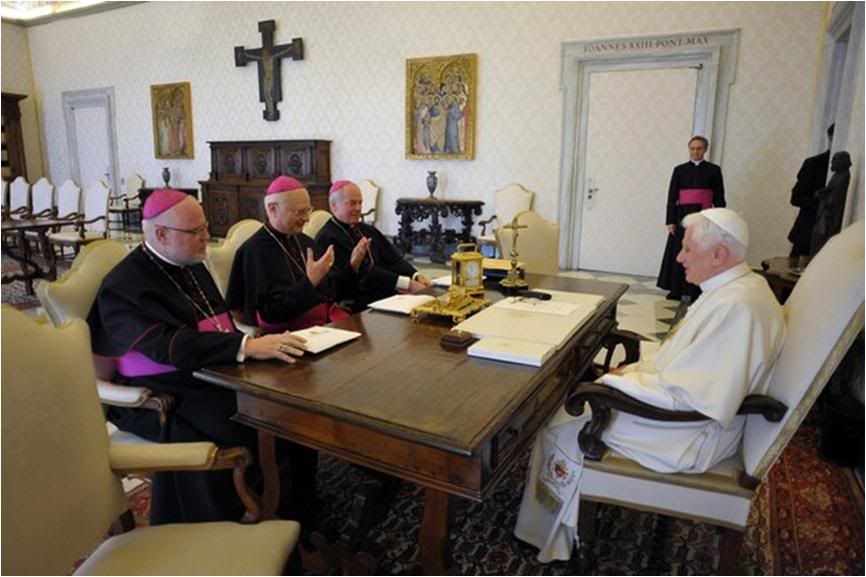 From the left, Monsignors Marx, Zollitsch and Losinger.
From the left, Monsignors Marx, Zollitsch and Losinger.
VATICAN CITY, April 29 (AFP) - Pope Benedict XVI on Thursday granted an audience to three senior German bishops following the resignation of one of their peers who admitted to beating children in his care.
Benedict received the head of the German conference of bishops, Robert Zollitsch, as well as Munich Archbishop Reinhard Marx and Anton Losinger, the auxiliary bishop of Augsburg in southern Germany, a Vatican statement said.
One of Germany's most senior bishops, Walter Mixa of Augsburg, tendered his resignation to the Pope last week after admitting that he hit children at a Church-run orphanage in the 1970s and 1980s.
Pope Benedict has yet to respond to his resignation.
In common with other European countries, Germany has been rocked by revelations that children were physically or sexually abused in institutions, the vast majority run by the Roman Catholic Church.
The scandal has badly damaged the standing of the Church in Germany, and also of the Pope, whose appointment five years ago as leader of the world's 1.1 billion Catholics was a source of great national pride.
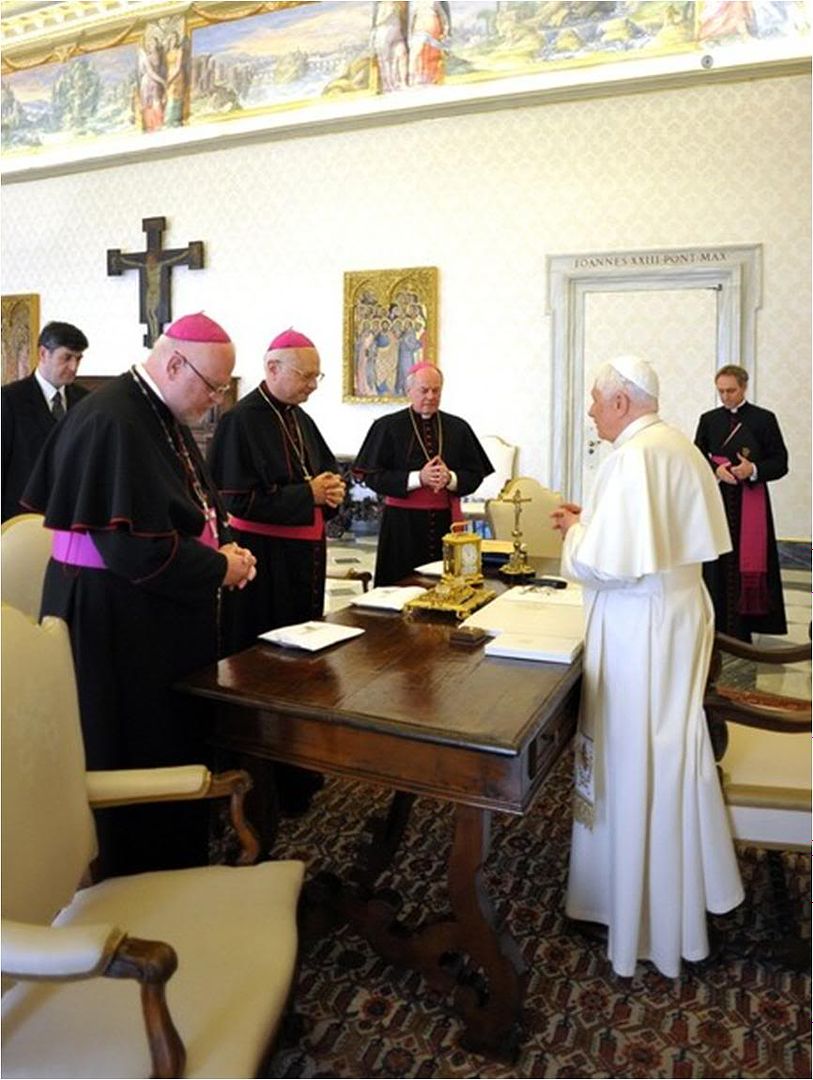 |
| |
 30/04/2010 02:15 30/04/2010 02:15 |
|
| | | OFFLINE | | Post: 20.068
Post: 2.709 | Registrato il: 28/08/2005
Registrato il: 20/01/2009 | Administratore | Utente Veteran | |
|

 The first part of this report comes from information that accompanied a couple of articles in L'Osservatore Romano.
CONCERT FOR THE POPE:
The first part of this report comes from information that accompanied a couple of articles in L'Osservatore Romano.
CONCERT FOR THE POPE:
Anniversary tribute from
the President of Italy
Translated from various sources
April 29, 2010
The President of Italy, Giorgio Napolitano, honored Pope Benedict XVI today with a concert performed by an orchestra of young Italian musicians at the Aula Paolo VI.
The musicians played movements from Mozart's Prague Symphony and Beethoven's Symphony No. 4.
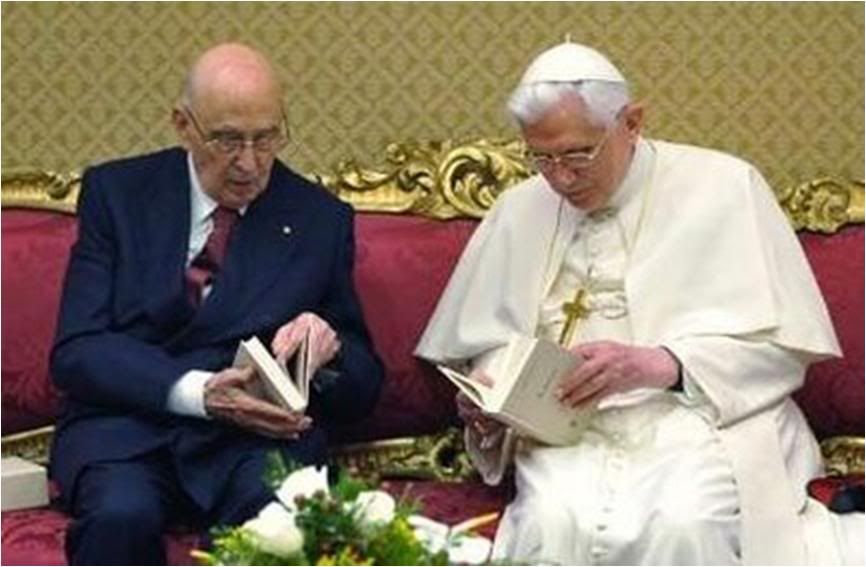
Before the program, President Napolitano also presented the Pope with a special gift: a special re-issue of De Europa, a book written by Enea Silvio Piccolomini who would become PIus II (1458-1464), and who canonized Catherine of Siena (whose feast day, coincidentally, falls today).
The edition, limited to 500 copies, was published by Magnus publishing house and the Vatican Apostolic Library at the initative of the Italian embassy to the Holy See. President Napolitano, who wrote the Preface to the special edition, said it was an appreciation for Benedict XVI's efforts to promote a 'correct' vision of Europe.
After their private conversation in the formal reception room of Aula Paolo VI, the Pope, the President and the ranking cardinals who attended the concert proceeded to the auditorium.
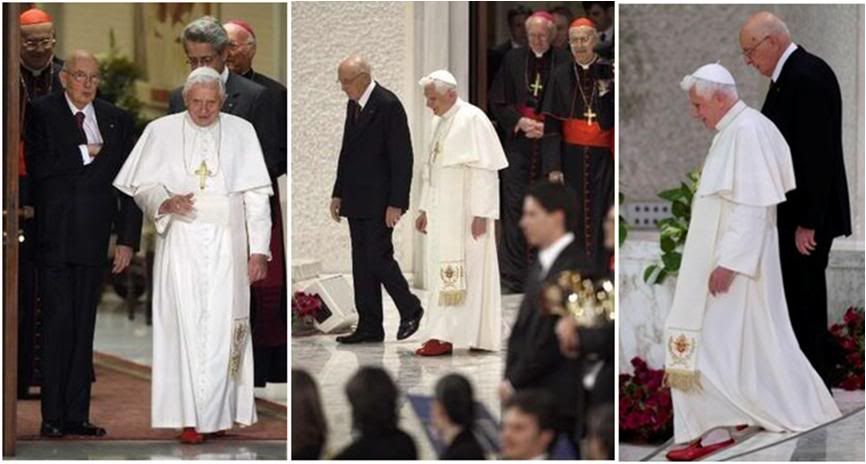
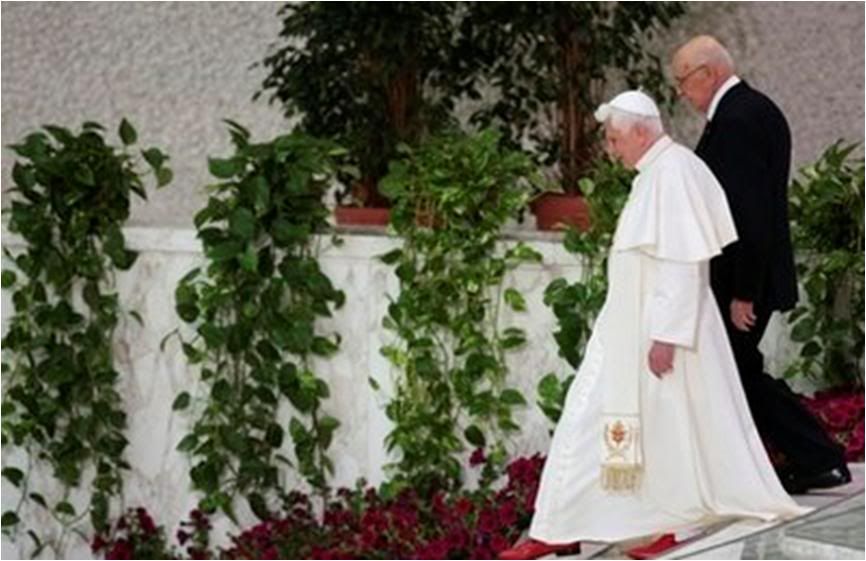
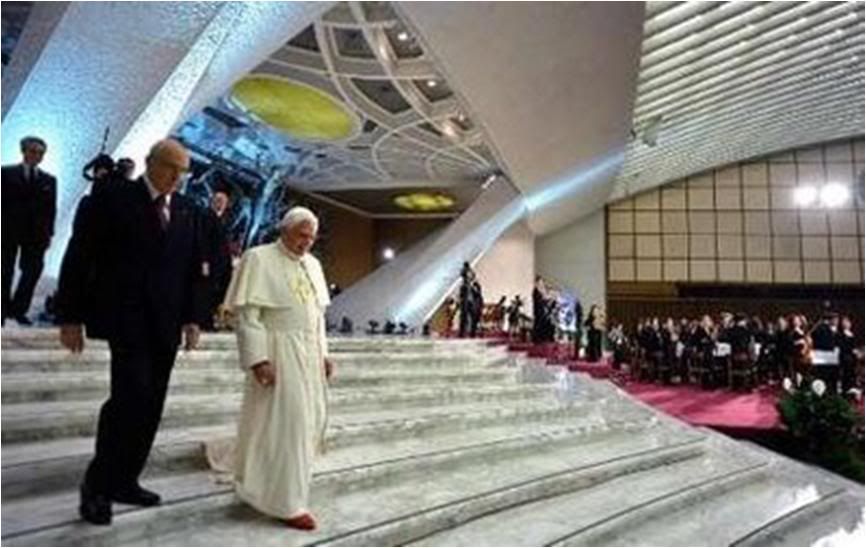
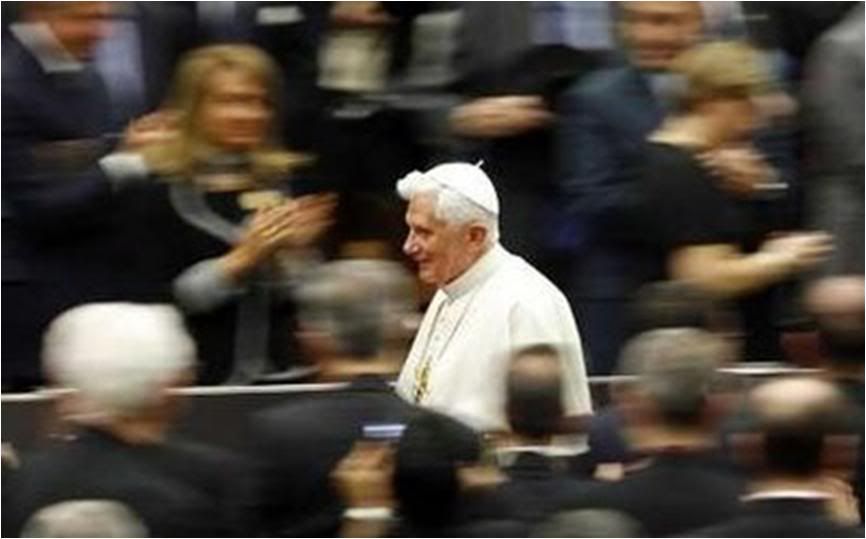
 This part of the account is translated from the online service of
This part of the account is translated from the online service of

In his greeting to the Pope before the concert began (no pictures from the news agencies), President Napolitano said: "The choice of a musical tribute is in itself an offering of serenity in the times that are not easy, indeed often harsh, which we are all living through."
The President assured the Pope of the 'most sincere' acknowledgement for the contribution of the Church and its priests to the wellbeing of the Italian people and of "the affectionate closeness of the Italian people".
He referred to "the problems of a changing world which is undergoing profound difficulties and unresolved crises, particularly in the Middle East, where the peace process continues to be uncertain.
"We believe," said the President, "that this crucial effort cannot do without the contribution of Europe and nations like Italy and Germany which are the bearers, yesterday and today, of our common European culture".
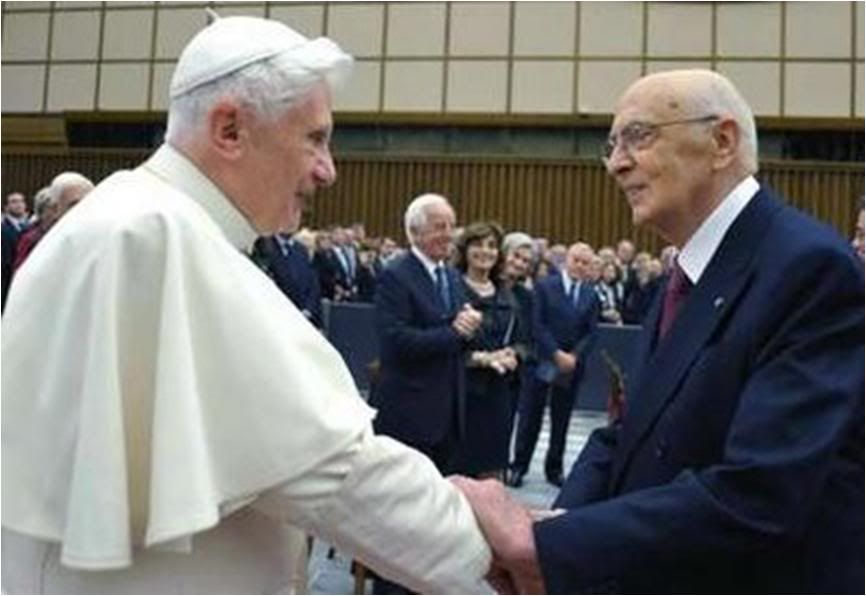
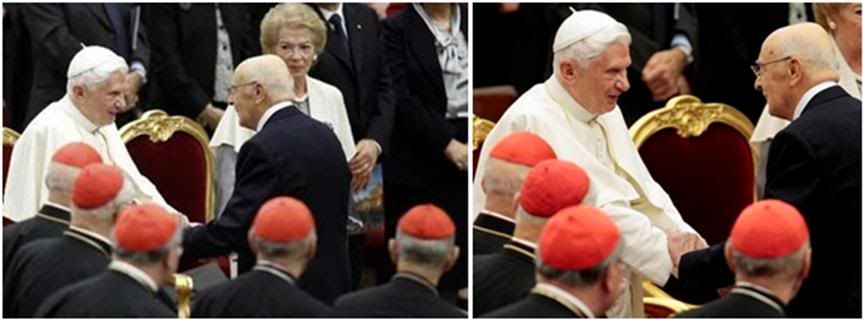
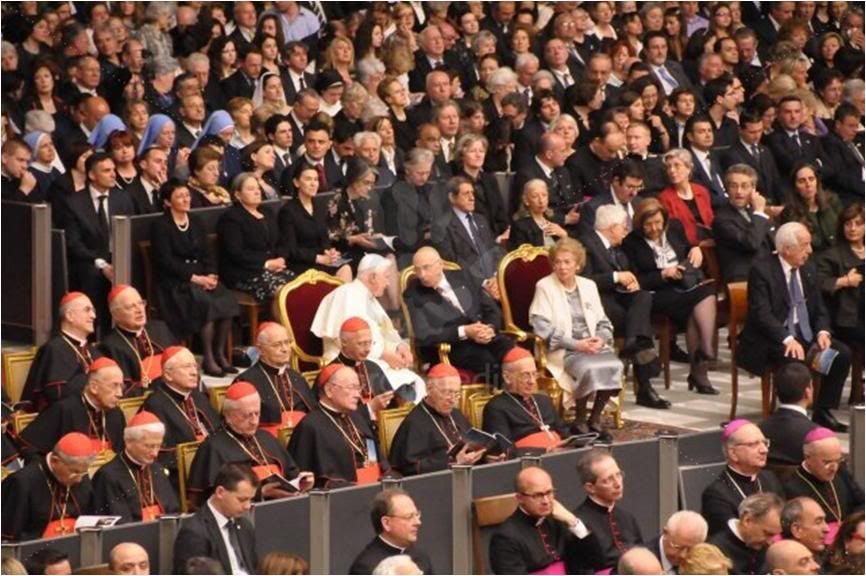 Note the seating arrangements: As usual, the Memores Domini sit behind the Pope, but among the cardinals, Sodano appears to take precedence over Bertone, as he is closer to the Pope - and Bagnasco takes precedence over the Curial cardinals beside him (though Cardinal Ruini is three seats away. I have never yet seen where GG sits during these concerts, but Mons. Marini is seen in the above photo.
Note the seating arrangements: As usual, the Memores Domini sit behind the Pope, but among the cardinals, Sodano appears to take precedence over Bertone, as he is closer to the Pope - and Bagnasco takes precedence over the Curial cardinals beside him (though Cardinal Ruini is three seats away. I have never yet seen where GG sits during these concerts, but Mons. Marini is seen in the above photo.
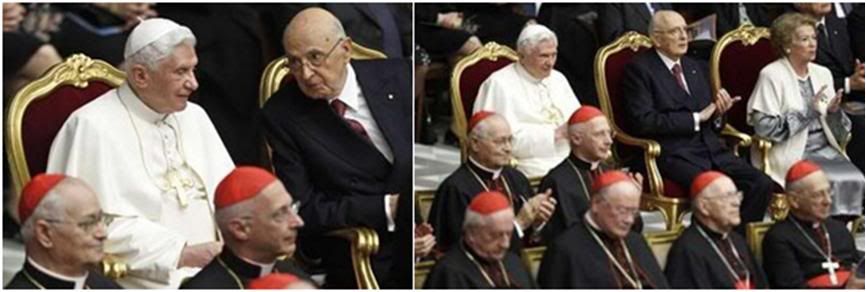
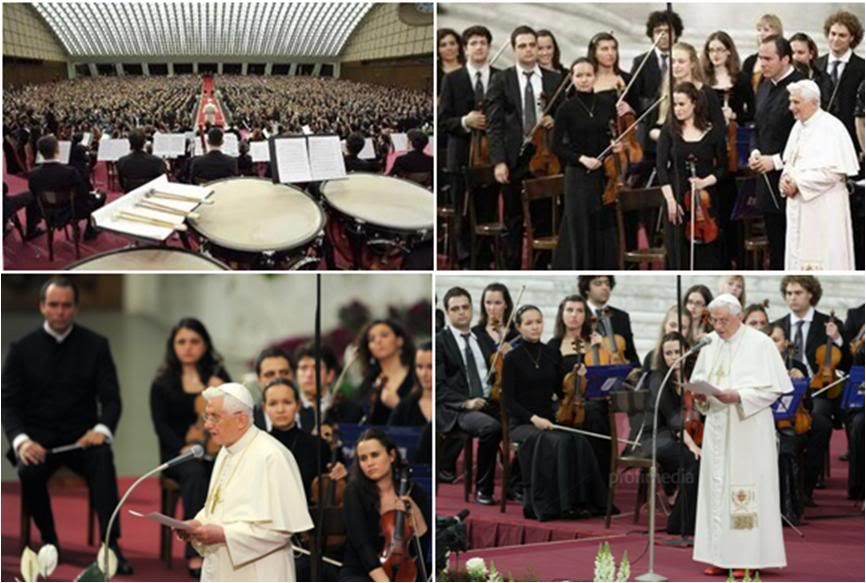 The following part of the account is translated from Salvatore Izzo's report for
The following part of the account is translated from Salvatore Izzo's report for

In his remarks after the performance, the Holy Father thanked Presdent Napolitano for this "further sign of the affection that the Italian people have always shown towards the Pope, an affection that was so fervent in St. Catherine of Siena, patron of Italy, whose feast day we mark today".
"Once more, the President of the Republic, with exquisite courtesy, has given us the chance to listen to excellent music on the anniversary of the start of my Pontificate. In greeting you with deference, Mr. President, along with your kind wife, I wish to express my sincerest thanks for the tribute of this concert and for the kind words that you addressed to me."
Praising the participation of the young musicians, who are students of the Scuola Musicale of Fiesole (near Florence), the Pope said, "Music is capable of opening minds and hearts to the dimension of the spirit and to lead people to raise their eyes towards the Most High, to open themselves to absolute Goodness and Beauty, whose ultimate source is God".
He said that "the festiveness of song and music are a constant invitation for believers and men of good will to be committed to give mankind a future rich in hope."
"Moreover, the experience of playing in an orchestra adds the collective dimension: continuous rehearsals held with patience; the exercise of listening to your fellow musicians; the commitment not to play 'by oneself' but to make sure that the different orchestral colors, while maintaining their own characteristics, blend together; the common search for the best musical expression - all this constitute formidable training, not only on the artistic and professional levels, but in total human formation."
He concluded by saying: "Dear friends, I hope that the grandeur and beauty of the musical excerpts that you masterfully exectued this evening can give everyone present new inspiration to work towards ever higher goals in their social and personal life."
" Remember me in your prayers, in order that, as I start the sixth year of my Pontificate, I may always be able to carry out my ministry according to the will of the Lord, who is our strength and our peace."
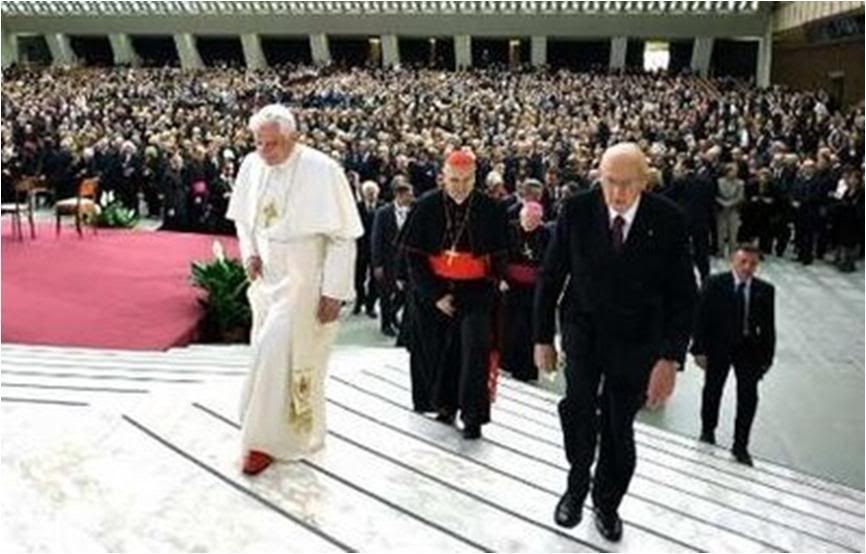
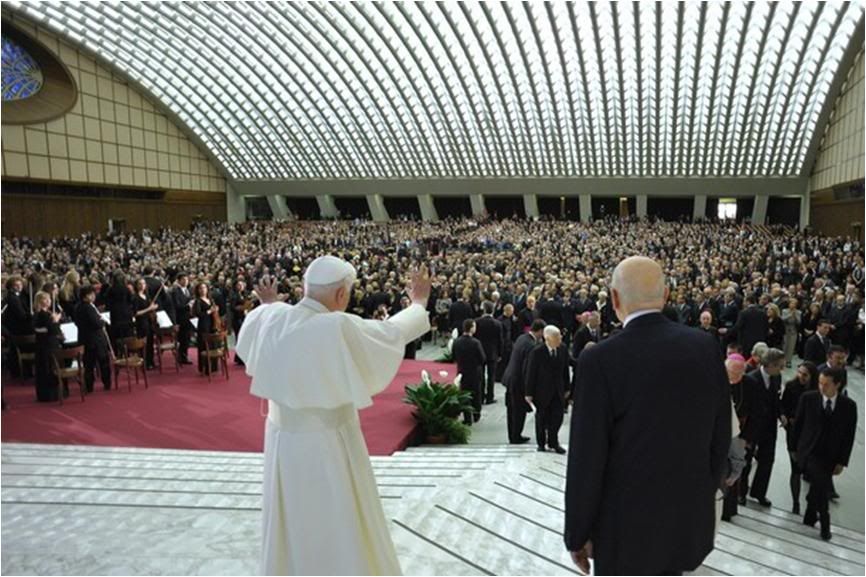
[Modificato da TERESA BENEDETTA 30/04/2010 15:27] |
| |
 30/04/2010 11:14 30/04/2010 11:14 |
|
| | | OFFLINE | | Post: 20.069
Post: 2.710 | Registrato il: 28/08/2005
Registrato il: 20/01/2009 | Administratore | Utente Veteran | |
|


 At the last concert offered for Benedict XVI at the Vatican (the Haydn Seven Last Words before Holy Week), I remarked after translating his remarks on the occasion that by now, he must have said and written enough about music and the other fine arts to put together a volume on Joseph Ratzinger, art lover and art critic. And here it is! It must have been in the press even as I was expressing my wish... The Preface is written by one of the leading conductors of our time, Riccardo Muti, who has also been the music director of La Scala since the 1990s.
At the last concert offered for Benedict XVI at the Vatican (the Haydn Seven Last Words before Holy Week), I remarked after translating his remarks on the occasion that by now, he must have said and written enough about music and the other fine arts to put together a volume on Joseph Ratzinger, art lover and art critic. And here it is! It must have been in the press even as I was expressing my wish... The Preface is written by one of the leading conductors of our time, Riccardo Muti, who has also been the music director of La Scala since the 1990s.
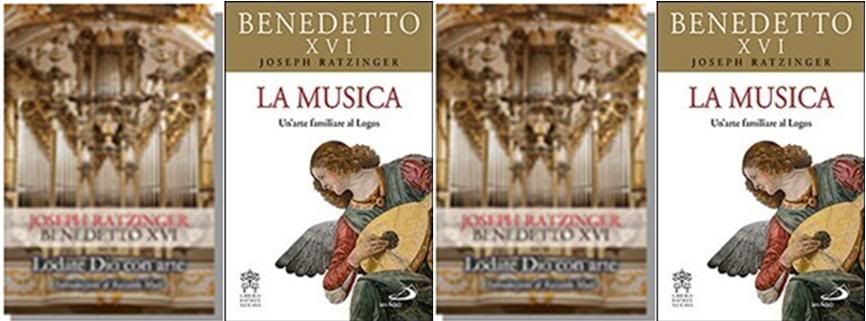
Actually, it is the second book of the kind put out by Marcianum Press in a few months - the first La Musica: Un'arte familiare al Logos [Music: An art akin to Logos] was a compilation dedicated to sacred music and song - of which the Holy Father has said and written much!
Music is a question of education
by RICCARDO MUTI
Translated from
the 4/29/10 issue of
 Editor's Note: The book Lodate Dio con arte [Praise God with art] (Venice, Marcianum Press, 2010, 254 pp) which puts together writings and discourses of Joseph Ratzinger - before and after becoming Pope - dedicated to art, but particularly to music and song. Here is the Preface to the book.
Editor's Note: The book Lodate Dio con arte [Praise God with art] (Venice, Marcianum Press, 2010, 254 pp) which puts together writings and discourses of Joseph Ratzinger - before and after becoming Pope - dedicated to art, but particularly to music and song. Here is the Preface to the book.
Of course, it is not necessary to be Pope to frequent the world of music as Papa Ratzinger does who, at his venerable age and with all the tasks that his high position of Pastor for the entire Church must mean, does not disdain sitting down at the piano himself to nourish his spirit by playing his favorite composers.
But it is a great gift to mankind and for the Church at the start of the third millennium to have a Pope who claims a place and respect in the Church and in society for this high human expression.
He started to love music and to make music from childhood up to the time when, as he tells it, thanks to his brother, he could feel himself part of the family of the Domspatzen, the boys' choir of Regensburg, who perform at liturgical services in the city cathedral.
His early musical experience has marked his life, as it does the life of us who are professional musicians. The experience of music enriches human existence and opens it up to horizons that seem to be infinite and eternal.
"To sing is almost like flying," the Pope confided after a Domspatzen concert. "It is rising up to God, in some way anticipating the song of eternity". Whoever learns to sing as a child will sing all his life, and all life for him becomes a song.
The Pope is right when, on quite a few occasions, he has lamented the low level of consumer music, particularly the music and songs executed in churches these past few decades, especially here in Italy.
But the reason is inadequate musical education. Too little is given in the schools, and alternative or subsidiary activities that could include music are only for the fortunate few.
And in the parishes, at least in Italy, I think that the musical education of Christians is among the least of the parish's pastoral concerns, and perhaps even of the bishops.
(Teaching) music and singing in Italy has been left to private initiative. And only for those who have the predisposition and the talent, who also have the financial means to attend a private music school or are lucky enough to be employed in a conservatory.
In our country, one has to fend for oneself - even for music and song. And I have denounced this on so many occasions. In an evolved society, musical education cannot be treated this way. It means not having respect for the cultural value of music. Above all, it means not acknowledging or not respecting the anthropological value of music in the formation of persons who must live in society and communicate with others.
Choral and instrumental practice, like reading and writing, should accompany the entire time of basic schooling, from kindergarten to high school. Just as education in written and oral expression are part of a person's school itinerary from start to end, gradually enriched by the different cultural elements that provide the material for what to say or what to write, it is hard to understand why the same thing cannot be done for educating our children for musical expression through he voice and musical instruments.
If something could be done in this respect, then we could also reverse the tendency to consider music as an activity for a few elect, as simply one of the possible professional undertakings, a commodity to be sold, or nothing more than a leisure activity. It would surely follow that even in our churches, there will be more singing - and far better.
So it would not be too much to hope, even from these pages, for a musical education that not only will not emarginate anybody from music training and the pleasure of listening, but above all, promote in every schoolchild the development of self-perception, which reaches maximal expression and self-understanding in making music together.
It will never be too much to ask for musical education that not only teaches children to listen to music, to decipher its language and its messages, and make it into part of their baggage of cultural values; that not only teaches them to read music and to play at least one musical instrument, but above all, to sing and make music together, assimilating its rules and exigencies through practice, because this will train them for choral teamwork even in life.
I am truly grateful to the Pope for having brought back music to its right place - as he does through this book - within the Church and outside it, simply calling attention to it as an essential factor in the life of men.
His studies are illuminating especially in the field of sacred music. They clear the ground of equivocations and fundamentalist absolutisms pro and con, that have created confrontation rather than dialog and a common striving for the good of the Church and her liturgy.
They explain the uneasiness that so many experience when they go to Sunday Mass. But they also make us hope for a restoration of musical art that makes for good service to the liturgy and to the life of this world.
I share completely what His Holiness says:
"If the Church is to transform itself, improve and 'humanize' the world, how can this be done while renouncing beauty, which is one with love, and with it, is the true comfort, the closest possible to the world of the Resurrection?
"The Church should be ambitious - it should be a house of beauty, it should lead the battle for 'spiritualization', without which the world would become 'the first circle of Hell'.
"Therefore one must aim for what is appropriate to the liturgy and to the participation of the faithful, but we must do everything so that what is appropriate is also beautiful and worthy of the most important ecclesial action for which it is used" (P. 33).
"Rightly, a Church that makes only 'music for use' falls instead into the useless and itself becomes useless," the Pope says further.
The Church has and should carry out a much higher task: "It should be a place of 'glory', and also a place in which the lamentations of mankind are brought to the ear of God. She cannot content herself with what is merely ordinary and 'useful': she should raise the voice of the cosmos to glorify the Creator, reveal his magnificence to the cosmos, and make the cosmos itself glorious, and therefore, beautiful, habitable, and lovable."
Additionally: "Musical art is called, in a singular manner, to instill hope in the human spirit, which is so marked and often wounded by the earthly condition. There is a mysterious and profound kinship between music and hope, between song and eternal life: it is not without reason that Christian tradition depicts the blessed spirits in the act of singing chorally, rapt and ecstatic at the beauty of God. But authentic art, like prayer, does not alienate us from the reality of everyday; rather, it makes us able to 'irrigate' this day-to-day in order to make it sprout and bear fruits of goodness and peace" (p.124).
Undoubtedly, the cultural revolution that took place in the past century has placed into crisis the traditional codes of reference which conventionally served to establish what is beautiful and what is not in music.
The tonal system, chosen for centuries to represent the natural complicity between the world of sounds and man's consciousness, has been systematically abandoned, and new paths have been followed and will certainly be in the future.
Music, especially in the last decades of the past century, has become a phenomenon that is extremely varied and variable. There has been a renewal and an amplification of the musical language just as there have been theological, liturgical, cultural and existential innovations.
The idea and the claim of a single cultural and musical model has fallen off, and an infinite number have taken its place. Music has ceased to be an occupation of the Church or of the bourgeois salon, to serve the dominant religious or political idea.
Every idea has its own music, and every music claims its own space and recognition on par with so many other cultural expressions. To judge their value is not possible if one does not enter into the human and religious dynamic that inspires each kind of music and expresses it.
This varies from people to people, from group to group, often from person to person. This has produced a great variety of expressions and styles, whose objective is not the transgression of conventional or natural rules, but the composition of music that expresses what they want to say while being other than what our ears have been used to hear. One cannot form a value judgment without taking into account this plurality of styles.
There is no style that can boast of primacy over the others and to which the others must measure up in order to be legitimately useful in the liturgy. All styles have a right of citizenship in contemporary culture, and, I daresay, even in liturgy, at least if one considers that behind every style, there is not just the work of the musician, but also men, or even peoples, who in that particular way express themselves, their life and their faith.
It would not be proper to make a choice. That is to say, to select the men and the image of themselves and of God that they cultivate and wish to communicate.
Nonetheless, even in the complexity of the present time and its plural expressions - all legitimate - I dare to hope that the inspiratory principles of authentic beauty evoked by the Pope will never be obscured or forgotten, principles upon which the musical patrimony of our culture and our history was created as an inestimable treasure, and which continues to speak in exemplary manner to the heart and the spirit of contemporary man, including the younger generations.
[Modificato da TERESA BENEDETTA 30/04/2010 13:58] |
| |
 30/04/2010 13:22 30/04/2010 13:22 |
|
| | | OFFLINE | | Post: 20.070
Post: 2.711 | Registrato il: 28/08/2005
Registrato il: 20/01/2009 | Administratore | Utente Veteran | |
|
 This is a very distressing article - almost as outrageous as an AP or New York Times attack on the Church - on two counts: it views the current 'crisis' - and Church communications, in general - purely in terms of the public relations angle; what it says about the attitudes of the Church's own local communications 'experts', who appear to have bought completely the common perception (and the article writer's) that the shortcomings of Vatican communications are entirely to blame for losing the communications war, as it were.
This is a very distressing article - almost as outrageous as an AP or New York Times attack on the Church - on two counts: it views the current 'crisis' - and Church communications, in general - purely in terms of the public relations angle; what it says about the attitudes of the Church's own local communications 'experts', who appear to have bought completely the common perception (and the article writer's) that the shortcomings of Vatican communications are entirely to blame for losing the communications war, as it were.
And this, despite the fact that this WSJ writer is aware that the autonomy of the dioceses and local bishops militates against the Vatican being able to help them with positively communicating what they have to say - if they have anything positive to say - because they have to communicate it themselves.
In crisis, the Catholic Church's
response is ad hoc
by STACY MEICHTRY

April 29, 2010
ROME — Pope Benedict XVI addressed a general audience here Wednesday that included a phalanx of priests and church officials who had gathered here to hone their response to the Roman Catholic Church's burgeoning sex-abuse crisis.
"I salute those participating in the communications conference," the Pope said amid his standard greetings to pilgrim groups from around the world.
His brief message to more than 100 church spokespeople underscored a divide that has appeared in recent months: Amid allegations of priestly abuse, often sexual and against minors, the Pope has rarely engaged directly in the Church's struggle to respond publicly. That has left priests, bishops and officials world-wide grappling with how to formulate their own response.
[This is such a preposterous claim! What was the pastoral Letter to the Catholics of Ireland but the Church's most comprehensive response ever to all the aspects of the problem? Why has everyone apparently forgotten all about that Letter which was made public only five weeks ago???? After the Pope had enunciated all that he did, other prelates simply have to pick out the appropriate passage as it applies to their local situation - and check out what is being done on the level of the local churches and the national Church in line with what the Pope spelled out.
They do not have to 'grapple' if they already have formulated their own local response on such a basis, and if they have not, then it is time they do. The Pope cannot speak for individual dioceses which are completely autonomous in their administration. Unless and until the local Church - or the victim - forwards to the CDF specific problems of sexual abuse, the CDF cannot do anything on its own. It must first be informed so it knows whether and what to investigate.]
Vatican officials who typically don't work together have formed an ad hoc group that attempts to send a consistent Church message. Dioceses in countries including Belgium and the Netherlands, meanwhile, have banded together to spur investigations into past abuses, attempting to get ahead of the scandal.
Lacking central direction, however, their strategies have been at times inconsistent or counterproductive. The Vatican public-relations team was forced to do quick damage control when the Vatican's No. 2 official linked sexual abuse of minors to homosexuality and a top Vatican preacher compared the scrutiny on the Pope to anti-Semitism. [Why, after all the explanations - or just a simple reading of the actual text said - is this misrepresentation still being made? Obviously, because endless repetition has codified it into a media factoid now crystallized into myth! Shame on Mr/Ms Meichtry for buying into and perpetrating the myth!]
In overall effect, an organization with a medieval management structure is countering a real-time, snowballing scandal of the sort that, when it involves a modern corporation, is typically met with swift crisis management and a unified message.
Even the Vatican spokesman says he has limited contact with Benedict. Rev. Federico Lombardi said this isn't a problem, though, because he communicates with the Pope mainly through advisers who "interpret his thoughts."
[A most unfortunate and ill-considered, almost thoughtless, way for Lombardi to express it. A more appropriate response would have been to say "I speak with the Pope when I have to, and when he wants me to say something specific".
First of all, I disagree about calling the Pope's associates 'advisers - simply because none of them is better equipped than he is on anything, including and especially the matter of communications.
Second, Lombardi is very much hampered by his adherence to bureaucratic hierarchy. His office is under the direct supervision of the Secretariat of State, which means in practice that Lombardi takes his orders from the Sostituto (deputy for internal affairs) Mons. Filoni - widely reputed to be among the main anti-Ratzinger elements in the Curia - or Cardinal Bertone himself.
But I will say it again: Nothing stops him from picking up the phone to Mons. Gaenswein, when he has to, to say, "May I speak to the Pope please? I need some guidance on such-and-such." He is derelict in his duty by not doing so - because surely he is aware of the loyalties involved.
And although no one doubts Cardinal Bertone's loyalty, he has shown a singular talent for: a) not taking any frontline position in standing up for the Pope at critical times, and b) saying something inopportune and muddling the issue when he does speak up, as he has done twice in a row in recent days (his comments on homosexuality and on priestly celibacy).
Fr. Lombardi, the Pope's interests, and therefore the Church's, are far more important than your misplaced (I think) adherence to bureaucratic seniority.]
"Certainly it's good that I know the Pope and the Pope knows me," Father Lombardi says. "But there isn't the need to meet him every day." [See? The statement I suggested would go very well with this remark!]
After the sex-abuse crisis began to rumble in November last year, Father Lombardi began to tighten up the Vatican's media operations, creating a small sex-abuse response team, including Archbishop Claudio Maria Celli, president of the Pontifical Council for Social Communications, and Giovanni Maria Vian, editor-in-chief of L'Osservatore Romano, the Vatican newspaper. The officials, who traditionally worked separately, began to meet regularly and coordinate their activity. [Really? It is not apparent at all. It still looks like a one-man operation by Fr. Lombardi, who has, in fact, shown the most and the best initiatives lately by his timely responses and by his editorials on Vatican Radio - neither of which are always carried by L'Osservatore Romano, which has had a very spotty record of following the sex abuse story - certainly with none of the assiduous continuity it shows in its Page 1 coverage of the least Obama headline initiative, whether it is opposing Israel building new housing in east Jerusalem, or his various arms reduction moves, or attempts at financial reform - indifferently reporting speculation and wishful thinking, along with concrete developments, as news!]
They've since attempted to remake Vatican communications. The Holy See now responds to media reports daily, compared with months at times in the past. It has an overhauled Web site and a Twitter page, and has started to use politicians' spin tools, such as forging its own narrative of the crisis to diffuse critical portrayals of the Pope. [Its own narrative? Setting the facts straight - and that is all it has done so far - is not 'forging its own narrative'!]
Even before the crisis, it hired San Francisco-based Internet consultancy Meltwater to comb the Internet for news of controversial issues facing the Vatican. [That's a necessary fulltime service, which, however, I do not see why the Vatican cannot assign its own qualified team to do that! Would that be more expensive than hiring a US firm?]
To some degree, the Church's response is bound to be decentralized. Throughout the crisis, critics have called on the Pope to rapidly remove bishops who covered up for abusive priests or committed abuse themselves.
But under Church teaching, all bishops and archbishops are equal and can't meddle in other dioceses. The Pope, as the Bishop of Rome, is expected to respect other bishops' autonomy as local administrators. Benedict has the formal authority to issue orders on issues from liturgy to doctrine, but bishops decide how to implement those orders inside their dioceses. [The problem is that in some cases, as in Summmorum Pontificum, their decision has to do with not 'how to implement' but 'how not to implement' the Pope's orders - a complete refusal to comply with their duty to be 'in communion with the Successor of Peter'.]
Last week's resignation offers by three European bishops came without pressure from Benedict XVI, Vatican officials and the bishops say. [Which is to say that some erring bishops have not lost all sense of elementary decency.]
Behind the scenes for the past two years, the Congregation for the Doctrine of the Faith, the Vatican office in charge of defrocking sexually abusive clerics, has been considering changing a Church law to give the Pope legal grounds to swiftly remove from office bishops suspected of covering up abuse, said a person familiar with the matter.
Officials in the office remain concerned that measures that strengthen the Pope's hand could upset the traditional balance of power between popes and bishops. "Otherwise you end up reducing the figure of the Pope to a despot," the person said. [Isn't that a complete misunderstanding of the authority of the Pope and the duty of the bishops towards the Pope?]
Many in the flock are seeking more guidance, including those who attended the three-day communications conference sponsored by the Pontifical University of the Holy Cross in Rome, which this year was largely given over to responses to the sex-abuse crisis.
Its participants listened to a public-relations consultant talk about crisis management at Italian companies. They heard an academic deconstruct newspaper articles about the scandal. They sat through a U.S. branding expert's talk about managing "one of the oldest and most complex brands out there." [See, it was all about the PR angle - not defining clearly what the responsibility is for the communicators themselves on their level, not at Fr. Lombardi's!]
Some expressed frustration at the lack of clear direction from the top. " Communication staff cannot communicate a clear message if Church leaders have not decided on the message in the first place," Andrew O'Connell, spokesman for the Irish religious order Presentation Brothers, said at a conference panel Tuesday. [How ironic that it should be an Irish religious who makes this comment. Has he even heard of the Pastoral Letter???]
" A crisis of management and a crisis of leadership," he said, hampers the Church's efforts to respond to critics. He included his own Top Ten list of crisis management: Avoid the drip, drip effect. Tell your own bad news. Pray. [The Vatican has nothing to do with the 'drip drip' effect, since it has no knowledge of what has been going on in the dioceses for decades about this problem. It's the local bishops who have to do all they can to find out anything that can and should be disclosed once and for all... and surely, the last thing the Church needs now is communications people pointing fingers instead of doing honorably what they ought to do.]
Others complained that the Vatican wasn't devoting enough manpower to managing the crisis. "Father Lombardi needs someone to help him," said Jozef Kovacik, spokesperson for the Slovakian Bishops Conference, speaking at a conference panel on understanding and explaining the church. Otherwise, he said, the Vatican was doomed to continue "playing defense."
[NO! All these communications 'experts' seem to think that the brunt of the communications effort should come from the Vatican - though they should know that because of diocesan autonomy, the Vatican cannot speak for the local bishops.
The bishops of Germany and Belgium have shown that they are able to speak up promptly in behalf of their local Churches, and their example should be followed. Cardinals Martin of Dublin and Brady of Armagh in Ireland are trying their best, but they are hampered by the damaging impact of the government reports on Dublin, and by Brady's own personal part in investigating one abuse case when he was a priest. The United States bishops took responsibility back in 2002, and their efforts are bearing obvious good fruit.
It is almost outrageous that these local communications people came to Rome to blame the Vatican without looking at what they themselves can and should do on their level to contribute to better communications. and more than that, better information - full and transparent.]
On Wednesday, the conference's closing day, more than 100 attendees packed into the Vatican press room to ask Father Lombardi how to respond to current media scrutiny. Calling the past two months "particularly intense," the Vatican spokesman called for "maximum transparency" in the face of the crisis to "reduce the perception that we have a secretive culture, or something to hide."
Attempts to modernize the Vatican's communications won't necessarily fix the systemic failings that led to abuse, says Barry McLoughlin, a public relations consultant who advised the U.S. Bishops Conference. For the new approach to succeed, he says, the Vatican needs to show it is willing to address these failings. "Otherwise you're just putting out fires," he says. [And how much more can the Vatican say and do 'to show it is willing to address these failings' than what the Pope and the CDF have been doing? The failings now have to be addressed specifically at the local level. How can a 'PR consultant' be so narrow-minded????]
Archbishop Celli, president of the Vatican's communication council, delivered a rare self-critique of the Church's overall response to media scrutiny Wednesday at the conference's conclusion, faulting Vatican and church officials for speaking in "canonical code." [Benedict XVI can certainly not be accused of that in any way! His Pastoral Letter to the Irish was a model of plain, straight talk that used not a bit of jargon at all. Publication of the CDF guidelines in layman's language was a step in the right direction. And Fr. Lombardi's recent statements have been equally straightforward.
It's one thing to be honest about one's failings, but to fail to see or acknowledge what one has done right is shooting yourself in the foot - and just another way of being 'politically correct', i.e., being hypocritical by seeming to be self-hypercritical! ]
"Some people have told me recently...that we're lacking a strategy of communication," he said. "I think there's some truth to this, even if there has been some recent change."
While the Pope hasn't shown a desire to direct communications [NOR SHOULD HE! His mission concerns a higher communication], he appears to have blessed the use of some modern public-relations strategies. [That is also a mis-statement. He approves of the use of all the new media themselves - not of any particular strategy, because for the Vicar of Christ, the only 'strategy' is to tell the truth and do what is right according to the Gospel, not according to a PR manual!]
"Churches and religious institutions should not hesitate to encourage educational tracks" offered by Catholic and ecclesiastical universities, he said in a talk to Italian Church officials Saturday. "May the world of social communication fully enter pastoral programs. "
[Modificato da TERESA BENEDETTA 30/04/2010 15:30] |
| |
 30/04/2010 14:25 30/04/2010 14:25 |
|
| | | OFFLINE | | Post: 20.071
Post: 2.712 | Registrato il: 28/08/2005
Registrato il: 20/01/2009 | Administratore | Utente Veteran | |
|

 A belated pick-up...
We need to take the politics
A belated pick-up...
We need to take the politics
out of Pope Benedict’s visit
Editorial

28 April 2010
The ridiculous insults directed at the Holy Father by Foreign Office officials raise fundamental questions about the papal visit to Britain in September. The Vatican has decided that Pope Benedict will proceed with the trip; but it is under no illusions about the gravity of the situation.
The memo, which proposed that the Pope should launch his own brand of condoms and open an abortion clinic, was more than a schoolboy parody intended for internal consumption. While the authors did not expect the proposals to be taken seriously, their intention to mock Catholic teaching was perfectly genuine.
Apologies have been issued, but the question remains: how can Britain stage a successful state visit when the civil servants organising it exhibit ignorant hostility towards the Pontiff?
This newspaper believes that a state visit will be very difficult to arrange successfully, and not just because the Foreign Office has compromised its professional standards.
The event has become a political football: in the second leaders' debate, Messrs Brown, Cameron and Clegg all welcomed it but expressed disagreement with Catholic teaching.
Moreover, the fact that this would be the first state visit to Britain by a Pope - John Paul II made a purely pastoral visit in 1982 - means that the taxpayer will foot much of the bill. Secularists, backed by the media, can therefore complain that their money is being used to celebrate an organisation they loathe (though Catholics also pay taxes). Their plans to disrupt the occasion are already advanced.
There is one relatively simple route out of this minefield, and that is to make the Pope's visit a pastoral rather than a state one.
After all, its main focus - the beatification of John Henry Newman - is primarily a Catholic event; and one could argue that, by offering his pastoral guidance to an embattled Church, the Holy Father will achieve far more than by taking part in a state-funded public relations exercise.
We hope it is not too late for the organisers of the visit to consider a radically different course of action better suited to these disturbing times.
I really do not understand why this had to be a state visit at all, but obviously the invitation was extended as such by the host government. But if it is not too late, then the suggestion seems very valid. Especially since the UK will almost definitely have a new government after next week's elections... Sort of like an announcement that "by mutual agreement, the government under Prime Minister (whoever), with the approval of the Queen, and the Holy See announce that Benedict XVI's visit will be a pastoral visit, not a state visit".
[Modificato da TERESA BENEDETTA 30/04/2010 14:26] |
| |
 30/04/2010 17:11 30/04/2010 17:11 |
|
| | | OFFLINE | | Post: 20.072
Post: 2.713 | Registrato il: 28/08/2005
Registrato il: 20/01/2009 | Administratore | Utente Veteran | |
|
 Friday, April 30
Friday, April 30
 ST.PIUS V (b Italy 1504, Pope 1566-1572), Dominican, Pope and Confessor
ST.PIUS V (b Italy 1504, Pope 1566-1572), Dominican, Pope and Confessor
Any first reading of the basic facts about Pius V's life is bound to raise the question, why is he not called Pius V the Great? He was a thoroughly holy man who faced great political and ecclesial challenges decisively, beginning with having to implement the epochal Council of Trent (which sat from 1545 and ended in 1563, just three years before he became Pope). What he did in the six years of his papacy, at the peak of the Counter-Reformation, defined the outward identity of the Church for the next 400 years. Born Antonio Ghislieri to a poor family near Turin, he took the name Michele when he became a Dominican friar, distinguishing himself as a professor of theology in Pavia for 16 years. Strongly committed to the defense of the faith, he asked to be named an Inquisitor and caught the attention of Paul IV who made him a cardinal and the Supreme Inquisitor. He was opposed by the next Pope, Pius IV, who deprived him of his office, only to be elected as his successor in 1566 - without the support of any Catholic monarchs, as was usual at the time, but championed by the man many thought would have been elected Pope, the future St. Charles Borromeo, Archbishop of Milan. Pius V inherited a Church that was plagued by corrupt clergy and the immediate consequences of the Protestant Reformation, as well as a Holy Roman Empire under threat from the Turkish armies, and constant bickering among the new nation states of Europe. At the same time, it fell to him to implement the Counter-Reformation measures of the Council of Trent. He established seminaries for the proper formation of priests; he published a Catechism of the Catholic Church during his first year as Pope; he promulgated a standard Roman Missal in 1570 by purging the existing Roman liturgy of non-essential additions over the centuries - a Missal which remained in use, except for minor revisions, until Paul VI's liturgical reform of 1969-70); he revised the breviary for priests; he legislated against clerical abuses; and he served the poor of Rome by using papal funds for banquets to build and fund hospitals. He proclaimed Thomas Aquinas a Doctor of the Church and promoted the liturgical music of Palestrina. He dismissed eight French bishops for heresy and declared Elizabeth I of England a heretic. He organized the Catholic states of Europe into the Holy League that defeated the Turks in the 1571 Battle of Lepanto against all odds, a victory he attributed to Our Lady of the Rosary, also called Our Lady of Victory after Lepanto. Interestingly, he helped Malta in its role as an outpost of Christian defense by sending his architect to design the fortifications of La Valletta, the capital. Yet all his life, he kept strictly to the Dominican Rule of prayer, fasting and austerity. Like a previous Dominican Pope, Innocent V, he preferred to wear his white Dominican habit, and ever since, Popes have worn white. Because of his enlightened defense of the faith, he is the patron saint of the Congregation for the Doctrine of the Faith. He is buried in the Basilica of Santa Maria Maggiore and was canonized in 1712.
Readings of today's Mass: www.usccb.org/nab/readings/043010.shtml
OR today.

Benedict XVI speaks to the new ambassador from the Democratic Republic of the Congo about
Reconstructing the social fabric in a country embroiled in civil war
The Pope indicates criteria for respect of human rights and national reconciliation
Other Page 1 stories: The Pope's address to the bishops of the western African nations of Gambia, Liberia and Sierra Leone; the US and Germany push for immediate aid to debt-strapped Greece; and US doubts about Afghan President Karzai and what he can do to fight corruption. In the inside pages, an article on the publication in France of two volumes putting together all known legends and historical writings by and on Francis of Assisi, and an essay on Catherine of Siena as the first female Doctor of the Church. Also, the text of Cardinal Tauran's address to the fifth World Summit of Religious Leaders held recently in Baku, Azerbaijan.
THE POPE'S DAY
The Holy Father met today with
- The five bishops who conducted the Apostolic Visitation of the Legionaries of Christ
- Participants of the plenary assembly of the Pontifical Academy for Social Sciences. Address in English.
- Cardinal George Pell, Archbishop of Sydney
In the evening, he visited the offices of the Congregation for the Doctrine of the Faith, to bless
its newly renovated Chapel. He also visited the relocated Archives and the new offices of Ecclesia Dei.
Afterwards, he addressed the officials and staff of the Congregation.
Earlier, the Holy Father sent a telegram of condolence to the Primate Abbot of the Benedictine Confederation,
Dom Notker Wolf, for the death today of Cardinal Paul Augustin Mayer, O.S.B., emeritus Prefect of the
Congregation for Divine Worship, and of the Pontifical Commission Ecclesia Dei.
The Vatican announced that a Mass of Suffrage will be offered for Cardinal Mayer at St. Peter's Basilica
on Monday morning, May 3. Cardinal Sodano will preside at the concelebrated Mass. The Holy Father
will conduct the last rites and deliver the eulogy.
[Modificato da TERESA BENEDETTA 30/04/2010 17:18] |
| |
 30/04/2010 17:29 30/04/2010 17:29 |
|
| | | OFFLINE | | Post: 20.073
Post: 2.714 | Registrato il: 28/08/2005
Registrato il: 20/01/2009 | Administratore | Utente Veteran | |
|

 Pope at Vatican meeting
Pope at Vatican meeting
on Legionaries of Christ

VATICAN CITY, April 30 (AP) – Pope Benedict XVI took part Friday in a Vatican meeting over the fate of the Legionaries of Christ after revelations that the group's founder had fathered children and abused seminarians.
The case against founder Rev. Marcial Maciel is being closely watched as the Vatican faces pressure to aggressively confront abuse. Benedict had not been expected to participate in the meeting between five Vatican inspectors and the Vatican's secretary of state, Cardinal Tarcisio Bertone.
But the Vatican spokesman, Rev. Federico Lombardi, said Benedict had decided to stop by the meeting to greet participants and make an appearance. He said he did not expect the Pontiff to attend the whole session. [An announcement later today indicated the meeting with the inspectors would continue tomorrow.]
The Vatican ordered an investigation in 2009 after the Legionaries acknowledged that Maciel, who died in 2008 at age 87, had fathered a daughter who is now in her 20s and lives in Spain. The Legionaries have also acknowledged that Maciel had also sexually abused seminarians and that two men are claiming to be his sons.
The five inspectors — all bishops appointed by Rome — spent eight months visiting Legionaries communities to get firsthand knowledge of the conservative order and its work. On Friday, they were reporting their findings back to the Vatican.
A statement was expected after the session, though Lombardi said earlier this week that no immediate decisions are expected. The Pope, Lombardi said, will make the final decision on the order's future after studying the case.
The Maciel case has long been seen as emblematic of Vatican inaction on abuse complaints, since sex abuse victims had tried in the 1990s to bring a canonical trial against Maciel but were shut down by his supporters at the Vatican.
The late Pope John Paul II had long championed the Legionaries for their orthodoxy and ability to bring in vocations and money.
In 2006, a year into Benedict's pontificate, the Vatican instructed Maciel to lead a "reserved life of prayer and penance" in response to the abuse allegations.
But a canonical trial was ruled out because of his advanced age and poor health.
The Legion of Christ is present in 22 countries, notably Mexico and Spain, and runs 12 universities. It counts 800 priests, 2,500 seminarians and 70,000 lay members.
[Modificato da TERESA BENEDETTA 30/04/2010 17:31] |
| |
 30/04/2010 19:32 30/04/2010 19:32 |
|
| | | OFFLINE | | Post: 20.075
Post: 2.716 | Registrato il: 28/08/2005
Registrato il: 20/01/2009 | Administratore | Utente Veteran | |
|
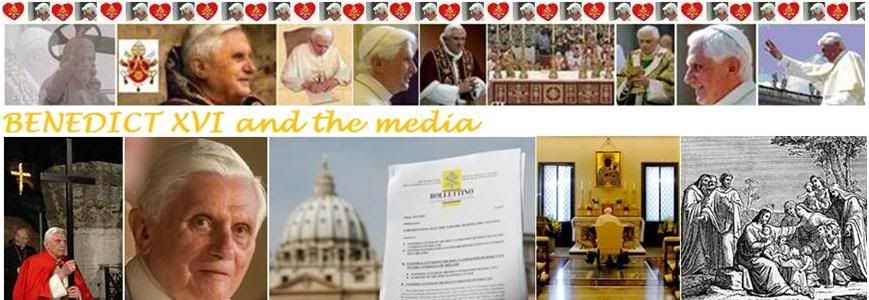 Too much incense for my sinuses - with a whiff of satanic sulphur! Mr. Woodward's facile and fallacious analogy comparing the New York Times to the Roman Catholic Church is, in a way, his genuflection at the altar of the Times, notwithstanding his disapproval. Of course, I find the analogy objectionable if not offensive, but Mr. Woodward does serve up statements by Times people themselves - apparently made with pride - of what they are and what they are out to do! Woodward was religion editor of Newsweek for 38 years, in whose place now sits the rabidly anti-Catholic and often embarassingly ignorant Lisa Miller.
Church of the ‘Times’:
Too much incense for my sinuses - with a whiff of satanic sulphur! Mr. Woodward's facile and fallacious analogy comparing the New York Times to the Roman Catholic Church is, in a way, his genuflection at the altar of the Times, notwithstanding his disapproval. Of course, I find the analogy objectionable if not offensive, but Mr. Woodward does serve up statements by Times people themselves - apparently made with pride - of what they are and what they are out to do! Woodward was religion editor of Newsweek for 38 years, in whose place now sits the rabidly anti-Catholic and often embarassingly ignorant Lisa Miller.
Church of the ‘Times’:
A DISSENT
by Kenneth L. Woodward
 This article will appear in
This article will appear in
the May 7, 2010, issue.
The New York Times isn’t fair. In its all-hands-on-deck drive to implicate the Pope in diocesan cover-ups of abusive priests, the Times has relied on a steady stream of documents unearthed or supplied by Jeff Anderson, the nation’s most aggressive litigator on behalf of clergy-abuse victims. Fairness dictates that the Times give Anderson at least a co-byline.
After all, it was really Anderson who “broke” the story on March 25 about Fr. Lawrence Murphy and his abuse of two hundred deaf children a half-century ago in Wisconsin. Reporter Laurie Goodstein says her article emerged from her own “inquiries,” but the piece was based on Anderson documents.
Indeed, in its ongoing exercise in J’accuse journalism, the Times has adopted as its own Anderson’s construal of what took place. Anderson is a persuasive fellow: back in 2002 he claimed that he had already won more than $60 million in settlements from the church.
But the really big money is in Rome, which is why Anderson is trying to haul the Vatican into U.S. federal court. The Times did not mention this in its story, of course, but if the paper can show malfeasance on the part of the Pope, Anderson may get his biggest payday yet. [And how could that come about at all? Quite apart from Anderson's fundamental but absurd premise that bishops and priests are 'employees' of the Vatican, all the cases Anderson has brought up so far were handled by the local dioceses concerned before 2001 when the CDF was given jurisdiction over sexual abuse cases, so Joseph Ratzinger had literally nothing to do with them. Not even with the Kiesle case, in which he intervened not on a sexual abuse case but on a request for laicization made by a priest and his bishop after the priest had already been convicted for a sexual crime.]
It’s hard for a newspaper to climb in bed with a man like Anderson without making his cause its own. Does this mean that the Times is anti-Catholic? New York Archbishop Timothy Dolan thinks it is — he said so last October in response to an earlier series of stories on clergy abuse. [In a letter the Times refused to publish!]
Whatever one thinks of Dolan’s accusation, clearly the Times considers sexual abuse committed by Catholic priests more newsworthy than abuse committed by other groups.
- An April 13 verdict against the Boy Scouts of America, which has struggled with the child-sexual-abuse issue for a century, did not merit page-1, above-the-fold treatment but rather a single paragraph deep inside the paper.
- A longer April 15 story about a Brown University student credibly accused of raping another student, an incident the university did not report to the police and arguably “covered up” at the request of powerful figures in the Brown community, appeared on page 18.
No question, the Times’s worldview is secularist and secularizing, and as such it rivals the Catholic worldview. But that is not unusual with newspapers. What makes the Times unique — and what any Catholic bishop ought to understand — is that it is not just the nation’s self-appointed newspaper of record.
It is, to paraphrase Chesterton, an institution with the soul of a church. And the church it most resembles in size, organization, internal culture, and international reach is the Roman Catholic Church. [This is sheer hyperbole and a metaphorical over-reach. The analogy is facile and very superficial. There is no way that the Times's secular hold on readers - most of whom do not even know the news they hear or read is from the Times - can possibly come anywhere near the bond of faith that every faithful Catholic has with the Church!]
Like the Church of Rome, the Times is a global organization. Even in these reduced economic times, the newspaper’s international network of news bureaus rivals the Vatican’s diplomatic corps. The difference is that Times bureau chiefs are better paid and, in most capitals, more influential.
A report from a papal nuncio ends up in a Vatican dossier, but a report from a Times correspondent is published around the world, often with immediate repercussions. With the advent of the Internet, stories from the Times can become other outlets’ news in an ever-ramifying process of global cycling and recycling. That, of course, is exactly what happened with the Times piece on Fr. Murphy, the deceased Wisconsin child molester.
The Pope speaks twice a year urbi et orbi (to the city and to the world), but the Times does that every day.
Again like the Church of Rome, the Times exercises a powerful magisterium or teaching authority through its editorial board. There is no issue, local or global, on which these (usually anonymous) writers do not pronounce with a papal-like editorial “we.”
Like the Vatican’s Congregation for the Doctrine of the Faith, the editorial board is there to defend received truth as well as advance the paper’s political, social, and cultural agendas. One can no more imagine a Times editorial opposing any form of abortion — to take just one of that magisterium’s articles of faith — than imagine a papal encyclical in favor.
The Times, of course, does not claim to speak infallibly in its judgments on current events. (Neither does the Pope.) But to the truly orthodox believers in the Times [How many would Mr. Woodward figure them to be - compared to the 1.16 billion baptized members of the Catholic Church as of December 31, 2008???? The April 2010 report from the Audit Bureau of Circulations placed the Times daily circulation at 951,663, compared to 2,090,000 for the Wall Street Journal, now #1 among US newspapers; The Times is #3 after USA Today. Surely the numerical comparison alone exposes the basic fallacy of his analogy!Even if you multiplied actual NYT circulation by a factor of, say, 20, to account for its 'worldwide' influence - that's 20 million compared to 1.16 billion!], its editorials carry the burden of liberal holy writ.
As the paper’s first and most acute public editor, Daniel Okrent, once put it, the editorial page is “so thoroughly saturated in liberal theology that when it occasionally strays from that point of view the shocked yelps from the left overwhelm even the ceaseless rumble of disapproval from the right.”
Okrent’s now famous column was published in 2004 under the headline “Is the New York Times a Liberal Newspaper?” and I will cite Okrent more than once because he, too, reached repeatedly for religious metaphors to describe the ambient culture of the paper. [Just shows you the delusions of grandeur that they have - and an indirect if perverse tribute somehow - to fancy themselves akin in any way whatsoever to the world's largest continuing institution (which is also a divine institution, not just human!). And Arthur Sulzberger is Jesus Christ????]
The Times also has its evangelists. They appear daily as the paper’s columnists. Like the church, the Times historically has promoted its evangelists from within the same institutional culture. This assures a uniformity of assumptions only the Vatican and Fox News can trump.
Even when the editors reach outside the corporate fold, as they must for columnists of even mildly conservative persuasion, they do not look for adamantine conservatives like George Will to match the heavy-breathing liberalism of Frank Rich and Paul Krugman. Culturally, conservatives David Brooks and once-a-week columnist Ross Douthat inhabit the same world as their liberal colleagues, though it must be said that Brooks and Douthat are the only Times columnists I can recall who welcome an expansive role for religion in public life.
At the Times, the public editor’s job is to examine the paper’s news stories for evidence of biased reporting and unwarranted narrative assumptions. (Would that Rome had ombudsmen — and ombudswomen — to represent voices not heard at the Vatican.)
On this point, Okrent’s essay was forthright: it is one thing to provide a “congenial home” for like-minded readers, he observed, “and quite another to tell only the side of the story your co-religionists wish to hear.”
On social issues like “gay rights, gun control, abortion, and environmental regulation, among others,” Okrent wrote, “...if you think the Times plays it down the middle on any of them, you’ve been reading the paper with your eyes closed.”
And there was this: “If you are among the groups the Times treats as strange objects to be examined on a laboratory slide (devout Catholics, gun owners, Orthodox Jews, Texans); if your value system wouldn’t wear well on a composite New York Times journalist, then a walk through this paper can make you feel you’re traveling in a strange and forbidding world.”
Indeed, even read with eyes wide open, the Times is remarkable for what it systematically leaves out. In its annual Christmas list of the year’s most notable books, there is no category for religion, much less theology.
A reader of the paper’s regular education coverage, not to mention its quarterly “Education Life” supplement, would never know that the New York Archdiocese runs one of the largest parochial school systems in the world. Or that the Lutherans, the Seventh-day Adventists, and Orthodox Jews also educate thousands of kids throughout the metropolitan area. In the secularist and secularizing world of the Times, only public schools and New York’s elite prep and nursery schools are worthy of the reader’s attention.
Every institution creates its own sheltering culture. The Holy See is larger, more complex, and much older than the Times, and the Roman curia is inherently more diverse than the newsroom of the Times, despite the latter’s periodic bouts of mandated diversity training. But as anyone who has covered the Vatican can tell you, its institutional culture is also inherently traditional, conservative, and self-protective. It is, after all, the last functioning Renaissance court.
As U.S. newspapers go, the Times is also a venerable institution and its hierarchy of editors, deputy and assistant editors, and copyeditors is a match for the Roman curia. The paper has been controlled by the Ochs-Sulzberger family since 1896. To those who devote their lives to it, the Times has become “a place that will shelter you the rest of your life,” as Arthur Gelb wrote in his detailed memoir, City Room.
I know what he means: Newsweek in the nearly four decades I worked there was also a sheltering institution. Moreover, with reporting flowing in from our worldwide news bureaus, we in New York felt as if we were operating at the throbbing center of the known and knowable universe.
Given its exponentially larger work force, not to mention hourly input from the Internet, this illusion is all the more powerful at the Times. A journalist could spend a lifetime in its newsroom without encountering a dissenter from the institutional ideology.
Every journalistic operation generates its own newsroom culture. By that I mean an implicit set of assumptions about what cultural norms and attitudes the newspaper, magazine, etc. should reflect in its collective editorial outlook. As in the church, these norms are passed down from the top, becoming part of the air the composite Timesman breathes.
For example, religion was well and routinely covered by Time magazine, because co-founder Henry Luce, the son of Presbyterian missionaries, considered the subject of major cultural importance. Religion was important at Newsweek because the magazine imitated Time’s template. Why is it then, that the devout of any religion should find the newsroom culture of the Times (Okrent again) “a strange and forbidding world”?
For that we have to look at the family dynasty that made the Times the nation’s establishment newspaper. After seven years of researching the Ochs-Sulzberger clan, biographers Susan E. Tifft and her husband Alex S. Jones concluded that “it has become increasingly apparent that the family’s self-image as Jews has profoundly shaped the paper.”
The story that Tifft and Jones tell in their extraordinary family biography The Trust is a narrative of social assimilation by the paper’s publishing clan, a determination not to espouse Jewish causes in its newspaper, and the family’s progressive ambivalence toward religion of any kind.
Much of this attitude was an understandable reaction to the pervasive and unapologetic anti-Semitism that characterized American culture at least until after World War II. And even today, of course, there is much criticism of the Times that smacks of The Protocols of the Elders of Zion, especially when it comes to the newspaper’s coverage of the Middle East.
Still, the paper’s institutional suspicion of traditional religions, especially when they assert themselves in public affairs, makes Orthodox Jews as well as conservative Evangelicals and Catholics feel like barbarians at the gates.
The most telling comment Tifft and Jones elicited in this regard was from the current publisher, Arthur Ochs “Pinch” Sulzberger Jr. He described his personal faith this way: “I have the Times. That’s my religion. That’s what I believe in, and it’s a hell of a thing to hold on to.”
I have to think a lot of people who write for the Times do too. Perhaps this is why some Catholic editorial columnists (names on request) cite the paper’s questionable reporting on the church as if it were revealed truth. It’s a nice example of how belief in the Times makes any other form of religious identification merely private and provisional when measured by the one true faith. [A great definition for secular fanaticism!]
Writing as a columnist, the affable Bill Keller once described himself as a “collapsed” Catholic. The adjective is new to me and I gather it describes how the weight of the Times as church collapsed his faith in the church of his earlier commitment.
As executive editor, Keller is now responsible for front-paging journalistically questionable stories that attempt but never quite manage to make the Pope personally complicit in the clergy-abuse scandal. He apparently thinks that Jeff Anderson has handed over the ecclesiastical equivalent of the Pentagon Papers.
No, I am not suggesting that the scandal is merely media-driven, as some at the Vatican have argued. There would be no stories if there had been no history of abuses and cover-ups in the first place. [True, but the suspicious timing and the doggedness with which the media has been driving this particular news cycle are perverse, manic-obsessive and bizarre!]
But I am saying that the Times has created its own version of the scandal as if they had discovered something new. They haven’t. Until they do, I remain a dissenter in the pews of the Church of the New York Times.
[Modificato da TERESA BENEDETTA 30/04/2010 20:35] |
| |
 30/04/2010 20:03 30/04/2010 20:03 |
|
| | | OFFLINE | | Post: 20.076
Post: 2.717 | Registrato il: 28/08/2005
Registrato il: 20/01/2009 | Administratore | Utente Veteran | |
|
 Available soon: DVD, photographs
Available soon: DVD, photographs
of traditional Mass held April 24
in Washington for the Pope

WASHINGTON, D.C., April 29 – The Paulus Institute announced today it will be making available a DVD and photographs of the historic Pontifical Solemn High Traditional Latin Mass (Extraordinary Form) celebrated last weekend at the Basilica of the National Shrine of the Immaculate Conception by His Excellency Bishop Edward Slattery of Tulsa, Okla.
This Mass – the first at the Basilica in nearly 50 years – was standing room only and watched live by many of the Faithful on EWTN. Due to an overwhelming demand, the Institute is working as quickly as possible to get the DVD produced and the photographs available.
Please bookmark www.PontificalMass.org and check back daily for updates. We will send out another notice when these products are completed and online.
The Paulus Institute was formed for the propagation of sacred liturgy. The Pontifical Traditional Latin Mass that took place April 24th in honor of Pope Benedict on his five-year inauguration anniversary was celebrated in front of about 4,500 Faithful at the Basilica.
The Mass featured several choirs singing sacred choral music and Gregorian chant.
On his blog, Father Z has been featuring comments from readers who attended the DC Mass or watched it on EWTN, as well as a couple of really gross, uncouth and ignorant putdowns by supposedly Catholic journalists. Not to worry - the beauty of the reactions from the faithful far more than outweigh the willfully blind rantings of the pathetically philistine press.
 Pope receives copy of complete
Pope receives copy of complete
English translation of Roman Missal
By Carol Glatz and Cindy Wooden

VATICAN CITY, April 29 (CNS) -- After nine years of work involving Vatican officials, English-speaking bishops around the world and hundreds of consultants, Pope Benedict XVI received a complete version of the English translation of the Roman Missal.
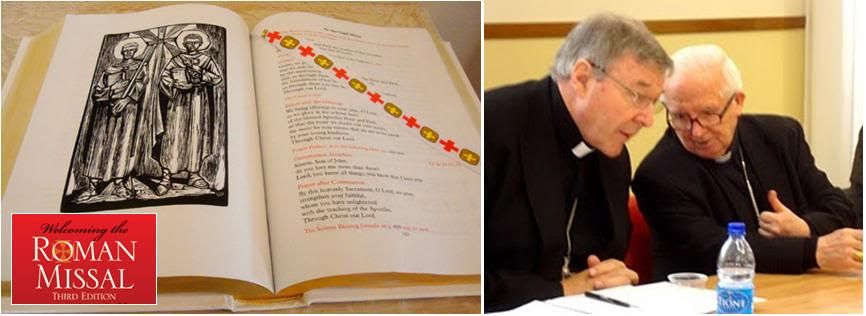 Left, the Missal presented to the Pope; right, Cardinals Pell and Canizares at one of the meetings this year leading to the approval of the Missal by the CDW.
Left, the Missal presented to the Pope; right, Cardinals Pell and Canizares at one of the meetings this year leading to the approval of the Missal by the CDW.
The white-bound, gold-edged missal, which contains all of the prayers used at Mass, was given to the Pope during a luncheon April 28 with members of the Vox Clara Committee, an international group of bishops who advise the Congregation for Divine Worship (CDW) and the Sacraments about English liturgical translations.
"Soon the fruits of your labors will be made available to English-speaking congregations everywhere," the Pope told the Vox Clara members.
"Many will find it hard to adjust to unfamiliar texts after nearly 40 years of continuous use of the previous translations," the Pope said, which is why "the change will need to be introduced with due sensitivity."
The Pope thanked the Vox Clara members and all those who contributed to the translation process because "through these sacred texts and the actions that accompany them, Christ will be made present and active in the midst of his people."
The new English-language Missal is a translation of the Latin edition officially promulgated by Pope John Paul II in 2000 and released in 2002.
The copy given to the Pope includes the "recognitio," or approval for use, dated March 25, 2010, and signed by Cardinal Antonio Canizares Llovera, prefect of the worship congregation, and U.S. Archbishop J. Augustine Di Noia, congregation secretary.
Chicago Cardinal Francis E. George, president of the U.S. Conference of Catholic Bishops, said that while the overall text has been approved for use, editions with specific adaptations for each country are pending. He said he expected the "recognitio" for the U.S. version before the end of May.
While Catholics definitely will notice the new translation, Cardinal George said, the change will be "far less dramatic than going from Latin to English was."
"When they see what a beautiful text it is, many people will welcome it," the cardinal told Catholic News Service April 29. Some people, for a variety of reasons, will not like the translation, he said, "but in the end it will be the text the Church uses for prayer."
Archbishop Terrence Prendergast of Ottawa, a member of Vox Clara, told CNS that members expect bishops' conferences in most English-speaking countries to begin using the new translation starting in Advent 2011.
After the Vox Clara meeting in January, the archbishop said, members left Rome wondering if it would be finished in time for the April meeting. The congregation and a group of volunteers working with Msgr. James P. Moroney, former executive director of the Secretariat for the Liturgy at the U.S. Conference of Catholic Bishops, "made sure that every line was checked and rechecked," he said.
Before a copy was presented to the Pope April 28, the Vox Clara members were briefed on "how they brought the final version together -- how the final recensions were made, the copy editing and the consultation with different people on how it sounded," he said.
Because the missal was translated in parts and approved in sections by the various bishops' conferences, some prayers that are used only occasionally had been translated slightly differently in different parts of the missal. The congregation determined which of the translations to use consistently, the archbishop said.
"While we may have had some reservations when we first started the project -- you know, 'I'd rather this than that' -- we began to see that the thing really came together and was a wonderful work of collaboration among the different countries of the world," Archbishop Prendergast said.
"I think we have a majestic, reverent text that is going to be a great contribution to the Church," he said.
The Latin missal text was translated into English by the International Commission on English in the Liturgy, a body established by English-speaking bishops' conferences. The conferences voted on each text and requested some specific wording for use in their own countries. The texts approved by the bishops' conferences were forwarded to the Vatican for approval. The congregation examined the texts with input from the members of the Vox Clara Committee.
The Vox Clara Committee is chaired by Cardinal George Pell, Sydney (Australia). Other members: Archbishop Oscar Lipscomb, Emeritus Mobile (USA), who serves as First Vice-Chairman; Cardinal Cormac Murphy O’Connor, Emeritus Westminster (England), who serves as Secretary; Cardinal Justin Rigali, Philadelphia (USA), who serves as Treasurer; Cardinal Oswald Gracias, Bombay (India), who serves as Second Vice-Chairman; Cardinal Francis George, O.M.I., Chicago (USA);
Archbishop Alfred Hughes, Emeritus New Orleans (USA); Archbishop Terrence Prendergast, S.J., Ottawa (Canada); Archbishop Peter Kwasi Sarpong, Emeritus Kumasi (Ghana); Archbishop Kelvin Felix, Emeritus Castries (Saint Lucia), and Bishop Philip Boyce, O.C.D., Raphoe (Ireland).
[Modificato da TERESA BENEDETTA 30/04/2010 20:35] |
| |
 01/05/2010 02:03 01/05/2010 02:03 |
|
| | | OFFLINE | | Post: 20.077
Post: 2.718 | Registrato il: 28/08/2005
Registrato il: 20/01/2009 | Administratore | Utente Veteran | |
|


 Last February [on Page 71 of this thread], I translated and posted excerpts from a 2009 book in German written for Herder, by the Vatican correspondent of Bayerischer Rundfunk (Bavarian radio and TV), Michael Mandlik, who has covered Joseph Ratzinger since 1995. In the book, he describes his coverage of him in Rome and during his apostolic journeys as Pope.
Last February [on Page 71 of this thread], I translated and posted excerpts from a 2009 book in German written for Herder, by the Vatican correspondent of Bayerischer Rundfunk (Bavarian radio and TV), Michael Mandlik, who has covered Joseph Ratzinger since 1995. In the book, he describes his coverage of him in Rome and during his apostolic journeys as Pope.
All thanks to Beatrice
 benoit-et-moi.fr/
and her friend Marie Anne Beaulieu, who is the Webmaster for the site of the Franciscan Custody of the Holy Land. They became friends during the Holy Father's pilgrimage to the Holy Land, when Beatrice made use of Marie-Anne's accounts on the site and on a collective blog in La Croix during the visit.
benoit-et-moi.fr/
and her friend Marie Anne Beaulieu, who is the Webmaster for the site of the Franciscan Custody of the Holy Land. They became friends during the Holy Father's pilgrimage to the Holy Land, when Beatrice made use of Marie-Anne's accounts on the site and on a collective blog in La Croix during the visit.
Marie-Anne has been passing on to Beatrice her 'summary' of the book, in French translation, chapter by chapter...
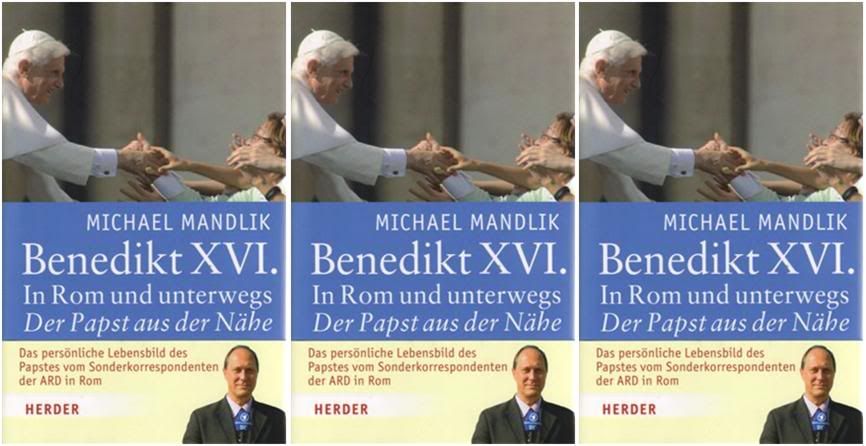
'Benedict in Rome and on the road: The Pope up close'
The first post was Chapter 1, where the author sets the stage for how he came to know Cardinal Ratzinger, and Chapter 2 - the first part of an interview which the cardinal gave him in 2002 to mark his 20 years as Prefect of the CDF. Felcitously, since Benedict XVI visited the CDF office today for the first time since the day after his election as Pope, I can post the full interview now, with a brief introduction by Marie-Anne...
RETROSPECTIVE:
Interview with Cardinal Ratzinger
on marking 20 years as CDF head
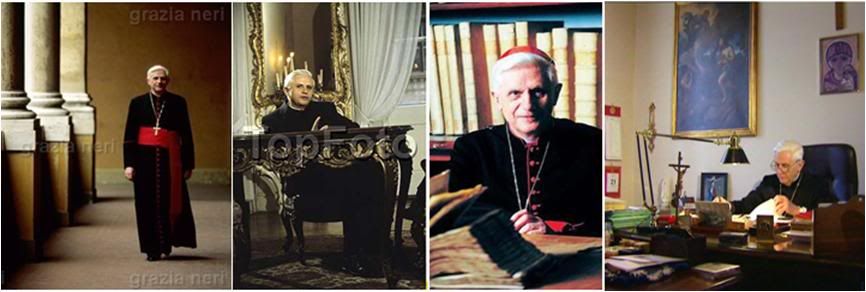
In 2002, to commemorate his 20 years as Prefect of the CDF, Cardinal Ratzinger gave Mandlik an interview for Bavarian TV. When one reads today what the cardinal said about his activities and convictions at the time, one finds a coincidence with the axis of the Pontificate he would commence three years later.
How would you describe your collaboration with John Paul II?
I would distinguish three types of meetings with him. First, group meetings when other cardinals and myself would sit with him for work - usually about an hour long. Then our Tuesday dinners which were more relaxed; and finally, my Friday meetings with him as Prefect. That is when I try to present various files to him, underlining various points of view about a question so that he could make a decision based on knowledge of the facts. Before and after these sessions, we find some time to talk about things of mutual interest, like the trip that he is preparing to take or that he has just made.
How would you assess the past 20 years - what is the proportion between the problems and the joys that your mission brings?
It is a mixture of both, certainly, and that's normal. But first, there is the joy of being in touch with practically the whole world - with the bishops who come to Rome every 5 years in successive turns for their ad limina visits. This allows us to take part in their pastoral experiences, to create close and cordial bonds and even friendships. And thanks to the lay faithful, to representatives of the worlds of politics and science who come to meet with us, we get to take part in the great events of our time, and to some degree, in the important decisions.
It is also very beautiful to feel the confidence of so many persons, particularly of our young collaborators, evne if they leave as soon as they have received the training they came for, giving way to others.
Besides all this, one cannot overlook the problems, the anxiety over whether our work is truly able to help. And one cannot be indifferent to being called Panzerkardinal... But it is also true that one cannot deal with important matters without having to undergo some form of insult....
For someone to reach where you have, one presumes a preparation that goes back to your origins, with your parents and your siblings...
Yes, to a very great measure. My parents had different temperaments which were complementary. Our father had the gift of reasoning with extraordinary clarity, and he was big-hearted in his judgments. He transmitted to us his serious and profound faith, while our mother showed us a warm faith that was not less demanding. She had a poetic soul, an affectionate heart, and she understood things intuitively.
This familial atmosphere marked us for life. My older brother then showed me the way that I would follow myself; and my sister with her humble faith, and her constant self-effacing availability, was always there to help me find the right solutions.
Thus, my family represented for me not simply the 'stem cell' of my origins, but also the driving force for the course I chose.
What was your work like here, at the CDF, in the past 20 years?
There was always a little of everything. It's a fulltime job - 36 hours a week, and then what one must do at home to finish up some things. Then, there are the emergencies, as there are in the life of the Church, and in the world as it concerns us. One must answer to many questions and requests with very few personnel. But one tries not to be submerged by the present, and instead, to set the stage for the future...
Among the many questions that the CDF had to deal with in the past 20 years, there is one that must be mentioned - which is, liberation theology. In the opinion of some, it almost tore the Church apart in the context of the East-West conflict. But now, no one speaks of it anymore. What do you think?
It is perhaps exaggerated to speak of a tearing apart, but it is true that it represented a great challenge. In effect, some theologians and pastors in Latin America sought to deal with concrete problems by using the faith as a factor that they thought could be immediately effective in resolving them.
Initially, it did not seem dangerous, but then, the faith was instrumentalized, becoming nothing but a pure and simple political force through which poverty was to be conquered, as in Marxism. The redemption obtained from God became subordinate to political activity that could effect a 'liberation'. So it became necessary to react vigorously in order to prevent the politicization of the Church.
Another mammoth subject as the Catechism of the Catholic Church, which you were in charge of compiling and publishing. Even if one just flipped through its pages to look for a specific reference, it is clear what an immense amount of work it must have required.
Yes, it was difficult to get started. But I must pay tribute to Mons. [Alberto] Bovone, who was the secretary of the Congregation at the time, and whose advice to me was very valuable. [Mons. Tarcisio Bertone took the place of Bovone after the latter was named by John Paul II to the Congregation for the Causes of Sainthood.]
We started by constituting a committee representing all the bishops of the world in their diversity as to theological sensibility and catechetical orientation. After numerous discussions, we agreed on an outline for the book. What would be the guiding thread? Where would we start? With the question of the existence of God? Or would we present the faith with its power of persuasion as an organic whole? Etc.
The first draft was in Latin which we sent to all the bishops of the world. Then we chose an editorial committee with 7-8 members representing all Christianity. The 'definitive' text took shape after numerous back-and-forth exchanges between this committee and the bishops.
It was a beautiful and enriching experience for all who worked together on it. It was very impressive to observe how so many opinions which were so diverse finally converged into one whole presentation. Of course, like any human product, it has its defects and can always be improved. But I think the vast project was well worth the effort, and the result is an offering to Christianity.
How must one use the Catechism of the Catholic Church? Is it a dictionary which allows for interpretation, or should oen consider it like the Bible?
As it is with the Bible, one cannot isolate sentences outside their context but they must be situated within the entirety of the book. This Catechism expresses all the faith of the living Church. We have therefore anticipated a corrected edition that will take into account a number of comments received after the first edition.
In Germany, certain topics stir up discussion about the view from Rome, for example on priestly celibacy, on sexual morality, or the ordination of women. Sometimes one has the impression of going around in circles. Why does the Catholic Church not follow the path traced out by Lutherans, Anglicans and other evangelicals in this respect? Then you would have the approval of the media and there would be less controversy...
Satisfying public opinion, certainly, but the discussion will go on until the threat of schism. It's what's taking place before our eyes among the Anglicans, where there is starting to be a movement to convert to the Catholic Church after leaving the Episcopalians.
[He was talking about this already in 2002!]
The Church cannot do what it 'wants'. The question is to know what is the mission of the Church. If faith were nothing more than the decisions taken by some old men in Rome, it would be too little. At this moment, I can ask myself: What interest can there be in going with them? Why must we do what they say? The next generation could very well decide something else!
If faith does not rest in God, who precedes us and comes towards us, then it is not worth believing in anything. Faith is not at our disposition. The question that we should always ask ourselves is this: What is the task that the Lord has entrusted to us?
The Pope is not an absolute monarch. He must always listen [to what God says]. I know that, humanly it would so much easier for him to allow the ordination of women, but he chooses to follow the current of the Church's great living tradition, faithful to the faith of the Church. What makes faith precious is that one can rely on it, in life and in death.
When you published DOMINUS IESUS in 2000, the document aroused a wave of protests which later subsided. What did you think? Was it all a misunderstanding?
Of course. Especially since many persons who criticized it never even read it. An internationally famous professor wrote me, for example, that after having read the newspaper reports, he did not have to read the text itself...
Now, what the text says is that our desire for unity does not mean we should agree on the least common denominator while neglecting the more important points - because that would mean a loss of our Catholic identity. Christian unity will be a polyphony where each part will have its place, all the while respecting the others, in order to advance together on the same path.
And afterwards, were there also positive reactions?
Yes, gradually, we started receiving letters of encouragement, with less hasty reactions, even if their viewpoints were different.
For example, for the followers of the Indian religions, it is difficult to admit that God became man in Christ, which would mean that Christ is greater than the figures who represent the other great religions.
With the Orthodox, we share the idea of episcopate based on sacrament since the beginnings of Christianity. But the Protestants use the Word of God as the starting point, and so they have a different viewpoint for considering the hierarchy of the Church. But all this can and must be discussed with mutual respect.
How do you see the relationship among the great religions at this time? Can we imagine a religion that transcends frontiers and peoples, thanks to which we can all belieeve in a common God?
I think that the concept of God is very different among the religions. Take Buddhism, for example, where one cannot think of God in the sense of a person, as in the monotheistic religions. On the contrary, the children of Abraham all have the same idea of a Creator God that binds us to each other. So even if we have enormous differences, we can 'walk together'.
I don't think that ultimately it will be possible to blend all the religions into one, but rather that they should enrich each other mutually. As the Pope said recently, as long as the Name of God remains the God of peace, and that religion is not spread through violence but by the power of Love.
Can one oppose progress in technology to religion? And will religion be overcome by science?
But they have to do with two different planes. On the part of science, one must always ask - what is useful and what is harmful. That is, the ethical norm is the utility of obtained results. Otherwise, instead of constructing, one ends by destroying the work of the Creator.
On the other hand, religion is concerned about man's ultimate end, his dignity - and this is beyond experimental determination. We must learn to consider these two levels as complementary. A religion without reason would be as harmful to humanity as science which completely discards the criterion of religion. It is only this way that we can answer the essential questions, "Who am I? What should I do?"
Is it not dangerous for the Church that scientists are capable of demystifying God in the name of progress?
True, but nonetheless, man continues to feel the need for God, especially in questions of life and death. Think of Pascal, for whom man was no more than a reed, but a thinking reed! Situated in the midst of the universe, at the intersection of the microcosmos and the macrocosmos, man must ask questions about himself, his end, about love and suffering, in order to know that his existence is worth far more than all the calculations of probability in the universe.
What about research in the field of genetics in order to cure heredeitary diseases, and then cloning? Do not all these things lead to a demystification of the divine?
Of course, to a certain degree one can manipulate human beings. But man knows he is not a product of technology - that he is the result of a unique thought by the Creator God - therefore a unique being, with his own sufferings and joys, his need to love and be loved.
That is why we insist on the unique character of each person, and on his dignity, so that he may not be exposed to abuse by science, so that he may not be debased by something which should serve to promote him. I am thinking specifically of the eugenics practised during the Third Reich in such cruel ways.
What do you think of the current situation of the Catholic Church in Germany?
I must express myself with nuance. Since Germany is in western Europe, it has suffered the same decline in terms of religious practice and vocations. People see in Jesus a grat man and nothing more - and therefore, he can be criticized, like the whole Church, which is considered 'reactionary', having a past that included the Inquisition... And all this makes it more difficult for believers. Moreover, the situation of the family has changed - it is no longer considered as the basic cell of society. So raising children is also more difficult.
In Germany, there is a great potential in terms of the economy, but not as much in terms of faith. And yet, there is, in young people, an authentic desire to believe, with simplicity, and with joy. The rancours of the 1960s have disappeared. They now have the desire to draw from faith the power to create something great.
As I first said 30, 40 years ago, the Church will be in the minority, but it will have a new internal vigor so that it can once again be 'salt of the earth and light for the world'.
The Church is not in decline, it is going through a crisis in order to renew itself in all ways, so that it can be better situated in society in a way that it can bring it new vigor.
After 20 years at the head of the Congregation for the Doctrine of the Faith, is there something you would have done differently if you could start all over?
I think I can say No. With age, one mellows, one slows down - that is true. But as for the major decisions, they remain valid, especially since they were taken in consultation with experts, with the cardinals of the Church, and of course, the Pope. So personally, I would not do anything different if I had to do it all over.
Do you ever get angry with yourself?
Oh yes! When I cannot find papers that I have set aside and I lose time looking for them! Or whenever I think that I will not be able to meet a deadline for a specific task. Alas, I do not lack for occasions to be impatient with myself....
What is the most beautiful memory that you have as Prefect?
It is not an event that I will cite. The most beautiful thing for me, is St. Peter's Square, which I must walk across twice a day - it's there were I meet people who recognize me and say, "I read your book, and I am following what you say..." And then there are people who just walk up to me to express their good wishes, their recognition, in a way that makes me feel I have brothers and sisters around the world. This encourages me, and makes my work not just bearable but important and beautiful!
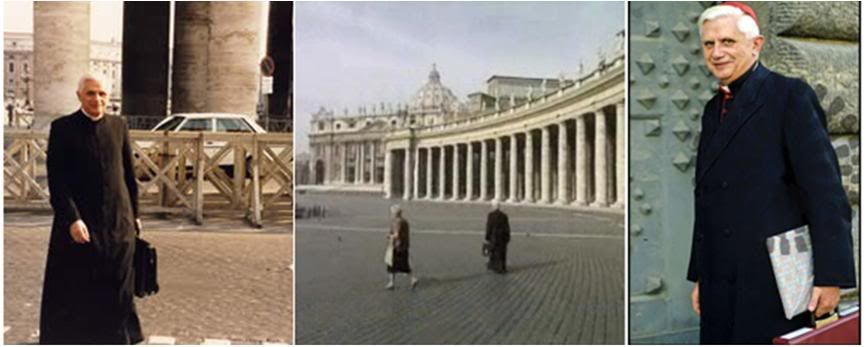

You are not just German, you are Bavarian. After 20 years away from Bavaria, what remains with you as unforgettable?
I don't feel separation from Bavaria, because it is profoundly anchored in me. The Bavarian character has blended with the Roman. Moreover, throughout history, Munich and Rome exchanged so much that Italians can say, "Oh Munich, it is like being in Italy!"
And of course, you can never forget what you experineced in your infancy and early years. Our roots continue to live in us.
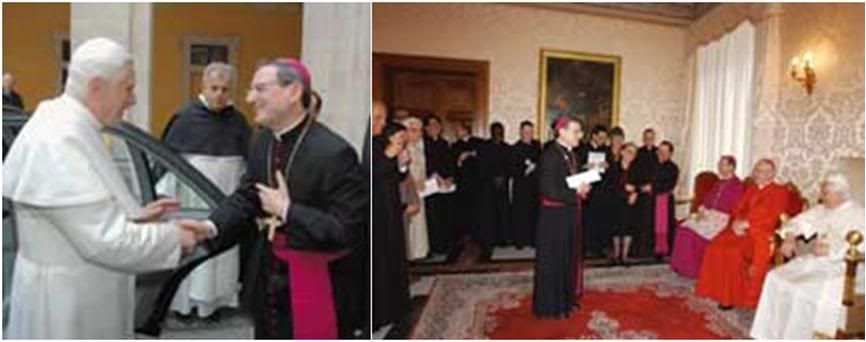 Pope Benedict XVI paid a surprise visit to the CDF the day after his election as Pope. Left, he is welcomed by Mons. Angelo Amato, then CDF secretary,
Pope Benedict XVI paid a surprise visit to the CDF the day after his election as Pope. Left, he is welcomed by Mons. Angelo Amato, then CDF secretary,
now Prefect of the Congregation for the Causes of Saints; and Fr. Augustine Di Noia, now secretary of the Congregation for Divine Worship.
Benedict XVI revisits the CDF
for the first time since 2005
Translated from

April 30, 2010
Pope Benedict today returned to 'his' former dicastery, the Congregation for the Doctrine of the Faith, which he led from February 1982 to April 2005.
Arriving around 6 p.m. at the Palazzo Sant'Uffizio, across St. Peter's Square from the Apostolic Palace, he was welcomed by Cardinal William Levada, whom he named to succced him as Prefect; Mons. Luis Ladaria Ferrer, secretary; and Mons. Damiano Caotorta, sub-secretary.
The Pope proceeded to the chapel of the dicastery for a brief adoration of the Blessed Sacrament. After welcome from Cardinal Levada, the Holy Father presided at the liturgy for the benediction of the new chapel, which has recently been restored. [Appropriately, the blessing is on the feast day of St. Pius V, patron saint of the CDF.]
The Holy Father then visited the new location of the Archives and the offices of the Pontifical Commission Ecclesia Dei, now attached to the CDF. This is where the Commission led by its secretary, Mons. Guido Pozzo, has been holding doctrinal discussions with theologians of the FSSPX. Three sessions have been held since last October.
Finally, the Pope proceeded to the conference room to greet the rest of the staff.
[Modificato da TERESA BENEDETTA 30/04/2011 14:04] |
| |
 01/05/2010 11:56 01/05/2010 11:56 |
|
| | | OFFLINE | | Post: 20.078
Post: 2.719 | Registrato il: 28/08/2005
Registrato il: 20/01/2009 | Administratore | Utente Veteran | |
|

 Pope addresses economic crisis
Pope addresses economic crisis
with Academy for Social Sciences

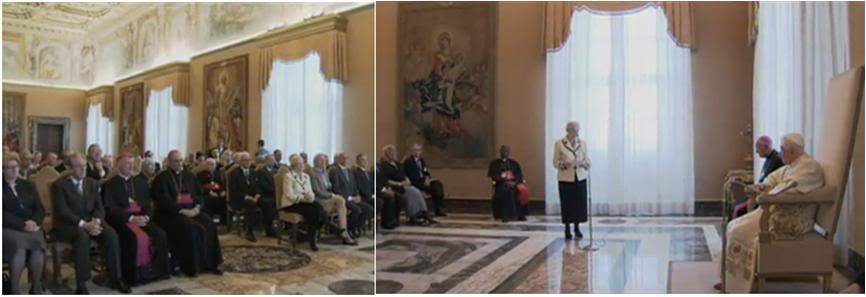 Prof. Glendon delivers a greeting to the Pope
Prof. Glendon delivers a greeting to the Pope.
(30 Apr 10 – RV) On Friday Pope Benedict XVI received members of the Pontifical Academy for Social Sciences, at the start of their annual Plenary Assembly, at the Consistory Hall of the Apostolic Palace.
Chaired by former US ambassador to the Holy See and current Learned Hand Professor of Law at Harvard, Mary Ann Glendon, the Academy will be meeting for its 16th session next week to analyse the global economic crisis in light of Church teaching.
The theme of the plenary is "Crisis in a Global Economy. Re-planning the Journey" to be held April 3- to May 4 at the Academy's headquarters in the Casina Pio IV in the Vatican Gardens.
Here is the text of the Holy Father's address, delivered in English:
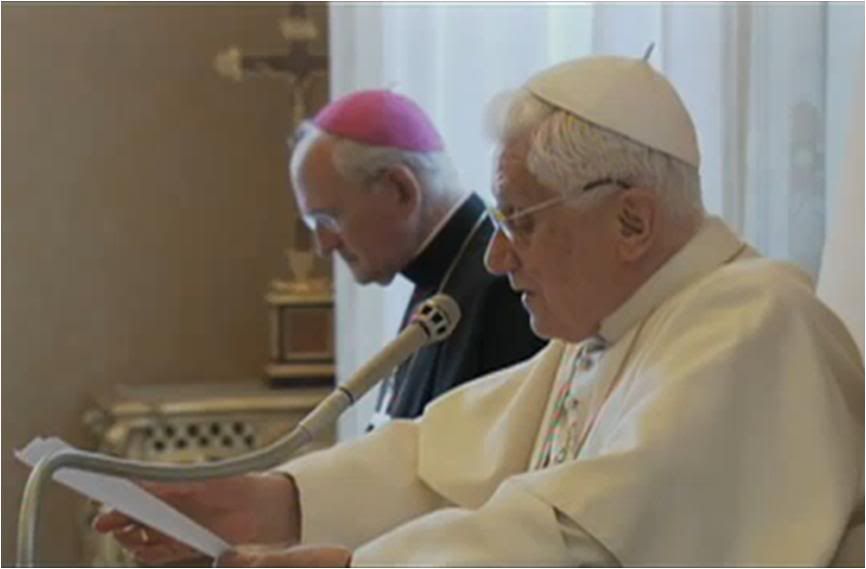
Dear Members of the Academy,
I am pleased to greet you at the beginning of your Sixteenth Plenary Session, which is devoted to an analysis of the global economic crisis in the light of the ethical principles enshrined in the Church’s social doctrine.
I thank your President, Professor Mary Ann Glendon, for her gracious words of greeting and I offer you my prayerful good wishes for the fruitfulness of your deliberations.
The worldwide financial breakdown has, as we know, demonstrated the fragility of the present economic system and the institutions linked to it.
It has also shown the error of the assumption that the market is capable of regulating itself, apart from public intervention and the support of internalized moral standards. This assumption is based on an impoverished notion of economic life as a sort of self-calibrating mechanism driven by self-interest and profit-seeking.
As such, it overlooks the essentially ethical nature of economics as an activity of and for human beings. Rather than a spiral of production and consumption in view of narrowly-defined human needs, economic life should properly be seen as an exercise of human responsibility, intrinsically oriented towards the promotion of the dignity of the person, the pursuit of the common good and the integral development – political, cultural and spiritual – of individuals, families and societies. An appreciation of this fuller human dimension calls, in turn, for precisely the kind of cross-disciplinary research and reflection which the present session of the Academy has now undertaken.
In my Encyclical Caritas in Veritate, I observed that "the current crisis obliges us to re-plan our journey, to set ourselves new rules and to discover new forms of commitment" (No. 21).
Re-planning the journey, of course, also means looking to comprehensive and objective standards against which to judge the structures, institutions and concrete decisions which guide and direct economic life.
The Church, based on her faith in God the Creator, affirms the existence of a universal natural law which is the ultimate source of these criteria (cf. ibid., 59). Yet she is likewise convinced that the principles of this ethical order, inscribed in creation itself, are accessible to human reason and, as such, must be adopted as the basis for practical choices.
As part of the great heritage of human wisdom, the natural moral law, which the Church has appropriated, purified and developed in the light of Christian revelation, serves as a beacon guiding the efforts of individuals and communities to pursue good and to avoid evil, while directing their commitment to building an authentically just and humane society.
Among the indispensable principles shaping such an integral ethical approach to economic life must be the promotion of the common good, grounded in respect for the dignity of the human person and acknowledged as the primary goal of production and trade systems, political institutions and social welfare.
In our day, concern for the common good has taken on a more markedly global dimension. It has also become increasingly evident that the common good embraces responsibility towards future generations; intergenerational solidarity must henceforth be recognized as a basic ethical criterion for judging any social system.
These realities point to the urgency of strengthening the governance procedures of the global economy, albeit with due respect for the principle of subsidiarity.
In the end, however, all economic decisions and policies must be directed towards "charity in truth", inasmuch as truth preserves and channels the liberating power of charity amid ever-contingent human events and structures.
For "without truth, without trust and love for what is true, there is no social conscience and responsibility, and social action ends up serving private interests and the logic of power, resulting in social fragmentation" (Caritas in Veritate, 5).
With these considerations, dear friends, I once more express my confidence that this Plenary Session will contribute to a more profound discernment of the serious social and economic challenges facing our world, and help point the way forward to meet those challenges in a spirit of wisdom, justice and authentic humanity.
I assure you once more of my prayers for your important work, and upon you and your loved ones I cordially invoke God’s blessings of joy and peace.
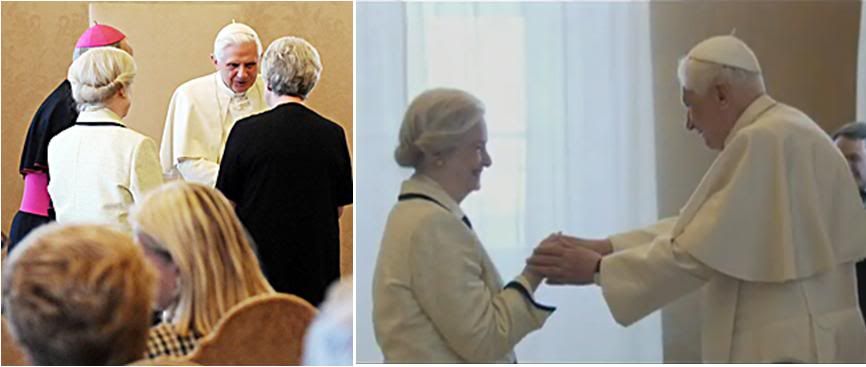
 |
| |
 01/05/2010 12:32 01/05/2010 12:32 |
|
| | | OFFLINE | | Post: 20.079
Post: 2.720 | Registrato il: 28/08/2005
Registrato il: 20/01/2009 | Administratore | Utente Veteran | |
|
 According to Damian Thompson, the Holy Father has been ill-served again by his Nuncio in Britain and by the Congregation for Bishops in his latest nomination for bishop in the UK.
If Cardinal Pell is promoted,
According to Damian Thompson, the Holy Father has been ill-served again by his Nuncio in Britain and by the Congregation for Bishops in his latest nomination for bishop in the UK.
If Cardinal Pell is promoted,
we might get some decent bishops

April 30th, 2010
I see that Cardinal George Pell of Sydney had an audience with the Pope today. I don’t want to raise false hopes, but if he were made Prefect of the Congregation for Bishops we might not end up with such uninspiring appointments as Archbishop Peter Smith to Southwark.
I don’t want to be nasty about Archbishop Smith: he’s good on the Today programme, which is more than can be said for any other Catholic bishop except +Vincent (Mons. Nichols, Archbishop of Westminster).
But I’d like to know what aspect of his record in Cardiff qualifies him to take over the bigger job of Southwark. Perhaps Archbishop Sainz, the Nuncio, can tell us – he’s a great Smith fan. Or Cardinal Murphy-O’Connor, whose appointment to the Congregation for Bishops was greeted with groans by all supporters of the Benedictine reforms. (Incidentally, a senior Catholic source reckons Archbishop Nichols wanted the irrepressibly jolly +John Arnold for Southwark.)
Let’s keep our hopes up. If Cardinal George Pell takes over the Congregation for Bishops, everything will change. He’s spent a lot of time in England, has lots of English friends and knows exactly how talented and loyal our bishops are.
What is keeping Cardinal Giovanni Battista Re from retiring? After all, he turned 75 in January 2009. Why has the Holy Father not replaced him yet?
Since he was the Sostituto (deputy Secretary of State for internal affairs) for years under John Paul II, he is known to have great influence among Curial middle managers who actually move the bureaucratic levers in the Vatican and certainly not a Ratzingerian in any way. Yet he managed to escape public scrutiny for his role in the Wielgus nomination and the Williamson case - in both of which , as Prefect of the Congregation for Bishops, he had primary responsibility for thorough backgrounding to provide to the Holy Father! As he was against the lifting of the excommunication for the FSSPX bishops but had to sign the decree in his capacity as prefect of Bishops, it looked fishy then, especially after the disparaging remarks he made about the revocation in the hearing of media representatives on the day the decree was announced.
|
| |
 01/05/2010 13:04 01/05/2010 13:04 |
|
| | | OFFLINE | | Post: 20.080
Post: 2.721 | Registrato il: 28/08/2005
Registrato il: 20/01/2009 | Administratore | Utente Veteran | |
|
 May 1, Feast of St. Joseph the Worker
May 1, Feast of St. Joseph the Worker
Patron of the Universal Church

HAPPY NAME DAY ONCE AGAIN
TO OUR BELOVED HOLY FATHER!
NB: Our Pope has four name days during the year:
March 19 and May 1, for St. Joseph;
March 21 (observed by the Benedictines)
and July 11 (official Church holiday) for St. Benedict.
NB: Today is also our first anniversary on this Forum. My profound thanks once again to Gloria for being our host.
 Saturday, May 1
Saturday, May 1
OR today.
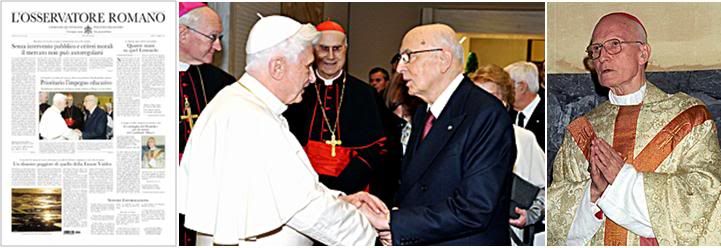 The main story today is the Holy Father's address to the Pontifical Academy of Social Sciences, recalling the principles of
The main story today is the Holy Father's address to the Pontifical Academy of Social Sciences, recalling the principles of
Caritas in veritate on the essentially ethical nature of economics, but saying that without public intervention and moral
criteria, the market cannot regulate itself. Other papal stories, the concert offered by the President of Italy for the Holy
Father on Thursday evening; the Pope's condolences on the death of his good friend, Cardinal Paul Augustine Mayer, OSB,
(photo above) who died yesterday at the age of 99; and two stories anticipating the papal visit to Turin tomorrow. International
news on Page 1: the environmental consequences of the BP oil-drilling explosion off the coast of Louisiana may well be worse
than that from the Exxon Valdez tanker spill off Alaska in 1989.
No events scheduled for the Holy Father today.
THE POPE'S PRAYER INTENTIONS FOR MAY
General intention:
"That the shameful and monstrous commerce in human beings,
which sadly involves millions of women and children, may be ended".
Mission intention:
"That ordained ministers, religious women and men, and lay people involved in apostolic work
may understand how to infuse missionary enthusiasm into the communities entrusted to their care".
[Modificato da TERESA BENEDETTA 02/05/2010 00:44] |
| |
 01/05/2010 13:35 01/05/2010 13:35 |
|
| | | OFFLINE | | Post: 20.081
Post: 2.722 | Registrato il: 28/08/2005
Registrato il: 20/01/2009 | Administratore | Utente Veteran | |
|
 WOW! is all I can say. This is the most impassioned and vivid statement I have read so far about the current 'crisis'. The writer is a convert to Catholicism and the author of Franklin Delano Roosevelt: Champion of Freedom and Richard M. Nixon: A Life in Full.
Pope Benedict and the scandal mongers
WOW! is all I can say. This is the most impassioned and vivid statement I have read so far about the current 'crisis'. The writer is a convert to Catholicism and the author of Franklin Delano Roosevelt: Champion of Freedom and Richard M. Nixon: A Life in Full.
Pope Benedict and the scandal mongers
Behind the breathless predictions of the collapse of the Church
is the incomprehension of its nature.
by CONRAD BLACK

April 30, 2010
The Roman Catholic Church has so long been regarded by some as a satanic fraud emporium, and by many others as a shrieking anachronism of quaint, costumed celibates engaged in obscurantist hocus pocus, that many commentators have aggregated the dreadful outrages of the sex-abuse scandals into an existential crisis. For those who think Rome is a levitation and a trumpery anyway, the slightest ripple or turbulence will bring it down.
The history of the Roman Catholic Church is replete with grotesqueries of license and schism and the intermittent descent of the papacy and cardinalate into anthills of sodomy and corruption of every kind.
The Orthodox Churches departed after about 500 years
[No, 1054 years, to be exact] over doctrinal and jurisdictional problems; the Protestants apostacized nearly 500 years later, some from genuine moral outrage at Rome’s profligacy; but others, such as Henry VIII, for motives not steeped in righteousness. The condition of the Church must putrefy before large numbers of people desert it, and even then, they are not lethal enfeeblements.
Nothing that follows here is intended to mitigate in the slightest the evil of anyone who sexually abused children or adolescents entrusted to him. There are 440,000 Roman Catholic priests in the world, and several million other Catholic religious personnel, and they have had authority over hundreds of millions of children in all parts of the world for longer than the lives of anyone now living.
Every potential complainant has been subject to group incentivization to retrieve incidents of abuse from the mists of their own memory (or imagination). And in the United States, the most rapacious mutants of the contingent-fee bar have been in overdrive for years seeking litigants.
The great majority of official complaints are frauds, as with the infamous denunciation of Chicago’s late Joseph Cardinal Bernardin, which was eventually exposed and admitted to be a blackmail attempt.
There are also gradations of abuse, from prurient curiosity, which is disgraceful but not criminal, to depraved and horrible episodes of aggressive coercion. It is rarely easy for a bishop to know at first how much credence to attach to a complaint. Just handing over anyone suspected or denounced by a party in interest, especially in the U.S., is likely to lead to more injustice than justice.
It is not so easy as the critics imply to distinguish a matter of repentance, discretion, reassignment, and therapy from an incident to be reported to the police. That does not in the slightest excuse many cases of concealment from higher-ups and civil authorities.
This was undoubtedly widespread in the United States and Ireland, but apparently not in other largely Catholic countries seemingly served by higher-quality episcopates, including Italy, Poland, Canada, and most of Latin America. (The Church retains responsibility for the souls of all adherents, including those guilty of the most repulsive acts; no sinner “is left behind.”)
Nor are these problems confined to Roman Catholic institutions. Unfortunately, an endless deluge of such disgusting allegations pours down on all types of child-care and education organizations.
The Roman Catholic bishop of Augsburg has just offered his resignation for beating boys decades ago in his role as an educator. Any man above the age of 50 who went through most U.S. school districts, especially southern ones, and British and British-imitative schools, including mine in Canada, remembers secular school faculty who took an inordinate pleasure in thrashing the rears of young men, and in less violent but more unambiguously deviant attentions.
But none of these other organizations possesses the size, claim of divine service or legitimacy — or, to its opponents, sinister nature — of the Roman Catholic Church.
Even if all the allegations of Catholic institutional child abuse were accurate, it would involve less than one percent of the clergy and young people who have gone through the Catholic school and social-aid systems. But it is a terrible problem, not only in itself, but because of the extent to which it has smoked out both the world’s papophobic death squads and the impartially voracious, equal-opportunity jackals of the world’s media.
As far as I can determine, Tarcisio Cardinal Bertone was not stating much more than the obvious when he said that adult males who impose themselves sexually on young boys are likely to be homosexuals. But he did not realize that in this atmosphere this would be widely construed as imputing pederasty to all people of homosexual inclinations, though that is not what he said.
Nor did a senior Roman Catholic churchman (quoted through an unnamed source by the New York Times) who compared anti-Catholic allegations and anti-Semitism mean to imply that pedophilic clergy were as innocent or as persecuted as Jewish Holocaust victims, nor that anti-Church accusations were led by Jews annoyed at the collapse of the spurious campaign that claimed Pius XII was a Nazi dupe. There are similarities in all kinds of bigotry without an exact equivalence in vitriol or depth of persecution.
It has been disappointing and irritating (but not surprising) that the New York Times has tried to set this controversy up as another Watergate, and with po-faced sanctimony reports each new weekly, unsubstantiated allegation of deviant clerical abuse in Moldova, Fiji, Timbuktu, Patagonia, and assumedly, the Moon. It wished to make it a war of a thousand cuts, escalating steeply and swiftly, on the Watergate pattern, to the destruction of the Pope himself: the drumfire of endless outrage confected and displayed with pseudo-grave neutrality, from which debouches the tribal move to execute the chief. “The king must die”; regicide as tokenism, as liberal group therapy.
We have seen it all before. The Times’s story on the Wisconsin priest who molested a large number of deaf boys between 1962 and 1974 claimed that the priest had suffered no disciplinary action and that the present Pope had prevented an ecclesiastical trial in 1996.
The Smoking Gun exuded a tiny plume of the wrong color overnight, as the Vatican replied with almost unprecedented promptness accusing the Times of what amounted to premeditated and defamatory falsehoods. The Wisconsin priest had immediately been stripped of the right to celebrate the sacraments, and prohibited from unsupervised contact with young people.
The assistant to Cardinal Ratzinger (as the Pope then was), when asked about an ecclesiastical trial of him, replied that it would be impractical more than 20 years after the offender was deprived of his priestly functions, throughout which time he had lived unexceptionably, and as he would die of inoperable cancer before the trial could get very far (as he did).
The Times’s lynching party showed no recognition that the Pope is elected by cardinals and serves for life and that the Holy See is a dictatorship that all are free to opt out of, but that none, and especially not secular media, can overthrow.
The Times began with a refusal to publish a letter from New York’s Archbishop Dolan, and was revved up by the poster-girl for angry, Irish, semi-lapsed Catholic contemporary spinsterhood, Maureen Dowd, calling for a nun for Pope, and ended with involuntarily donned, unrepentant sackcloth and ashes.
Benedict XVI has declared the Church to be ashamed and penitent, has met with victims and their families, has expedited investigative and corrective procedures, has opened up access for complainants, and has imposed fail-safe strict controls, without delivering his clergy to the howling cannibals.
He has handled it all like the great, scholarly, courageous, and profoundly civilized man he is, with humility, dignity, and effectiveness.
He should now decree a reasonable deadline for past complaints and start to lead the Church out of the fire, and close down the decades-long turning of the spit that the Church’s enemies had been ghoulishly preparing.
As the Pope tries to amputate what is bad, the Church’s enemies are trying to take advantage of that process to destroy the entire institution. This too is a pattern. Pius XII’s wartime performance was quite inadequate, but he did save 850,000 Jews, as is now coming to light. No one else did that.
This child-abuse crisis is shameful and evil and disgusting. Only the Church can stop, punish, confess, repent, and prevent recurrence, all on the scale required. It is doing so, late and over-cautiously. But secular witch-hunts and lynchings are not part of the solution, and if they continue, it may be almost time for a few Counter-Reformationist measures.
The scorching unction of the Church’s more rabid enemies might become more bearable to them if the Church’s adherents reconsidered their advertising budgets. In the case of the Times, its guardian angel, Señor Slim [Mexican drug lord who has now surpassed Bill Gates as the world's richest man and who loaned the Times some $250 million last year to keep it from going under], would surely fly to its aid again with another infusion of 14 percent yield, usurers’ junk bonds.
Behind the breathless predictions of the collapse of the Church is the incomprehension of its nature. Such comments were constant, though less stentorian, throughout the supposedly (and inevitably) “troubled and divisive” pontificate of John Paul II.
Yet when he died, it had twice as many adherents as when he began. Over 2 million people came to Rome from all over the world for his funeral, including 74 chiefs of state or government (more than have attended all U.S. presidential funerals in history combined).
Vocations and attendance at services are rising slowly, and are so far unaffected by these events, other than in Ireland (a country of 3.5 million people).
All Catholics know that those who stand between the terrestrial world that is familiar and that of the spirit that many dispute and that even believers can only darkly glimpse, are themselves just people, fallible and sinning. And the faithful depend and rely on the faith, not the other way round.
Almost all of the world’s practicing Roman Catholics, approximately 750 million people, whether born into the faith or, like me, converted to it from non-belief after losing faith in the non-existence of God, believe the same basic premises.
There are sometimes authentic miracles, which make it logically possible for any miracle to occur, and spiritual forces are abroad in the world that cannot be accommodated by atheism, and atheism is a perspective that inevitably encourages excessive egotism and comparative ethical indifference. Thus does God exist.
Jesus Christ, like a few others, was divinely inspired. He asked St. Peter to build a Church, and the Roman Catholic Church remains that church. We believe that the likeliest way, though not sure and not the only way, to be in the most direct contact possible with God is through the Roman Catholic liturgy and sacraments.
Roman Catholics do not think of our Church as a trend, a fad, or a high-quality brand, as of toothpaste or soft drinks, with a huge market share; it is the ark of eternal truth and man’s very best effort to date to explain the human project, an intellectual enterprise fundamentally beyond our abilities, as atheists acknowledge, while affecting scientific worldliness.
Within reason, the conduct of individual clergymen, even when hateful, disgusting, and criminal, does not alter our desire to attend our parish churches, say our prayers, worship God discreetly, confess our sins to and receive the sacraments from, our ordained pastors, and repent our failings as assigned.
And we believe, though many would not say it in exactly these words (of Cardinal Newman’s), that our consciences are God speaking within us, in a voice “powerful, peremptory, unargumentative, irrational, minatory and definitive.”
The vast concourse of us, the believers, is horrified by crimes in the clergy, particularly those that wound the defenseless and the susceptible. But they have little more impact on our faith than any other tragedy or the habitual violation of ecclesiastical counsels of perfection that we have all often ignored, such as against conventional sex as mere pleasure.
The Roman Catholic Church remains as it has been for nearly 20 centuries: drafty but impregnable at the intersection of the world and the spirit. Christopher Hitchens is my brother, whether he likes it or I like it (and I find it a promising divertissement).
“Dissolution does but give birth to new modes of organization, and every death is the parent of a hundred lives.” The world and the Church “are like an image on the waters, ever the same though the waters ever flow” (the about-to-be sainted Newman).
The personnel of the Roman Catholic Church is eminently fallible, but the Church is not impeachable, and certainly not by the dunciad of these unholy and unserious prosecutors.
The following presents a different reading of the 'crisis'.
Reading the scandal
with Biblical eyes
By Rev. Robert Barron

Once again we’re living in scandal times. The “Long Lent” that the American church endured in 2002 has now descended on the European Church. A significant difference is that this time the Pope himself has come under scrutiny.
Once again, the news media are in a frenzy — CNN has blanket coverage, the New York Times is running daily stories, and thousands of blogs are buzzing.
In preparation for a television interview, I spent an entire day reading almost everything I could find in both the American and international press (I’m currently in Rome as a visiting professor) and found the process dismaying, depressing, and dispiriting.
But what particularly struck me was this: though the scandal has been analyzed legally, institutionally, psychologically, and culturally, it has rarely been looked at biblically — even by Church representatives themselves. [Pope Benedict certainly has, and quite a few other bishops whose homilies touching on the scandal I have read - not perhaps with the Biblical specifics that Fr. Barron cites, but in the sense that the Church is made up of human beings who are sinners by nature - after the Fall - but they are in the Church, and the Church exists, to offer them redemption through genuine penitence. And that this penitence involves above all making up to the victims in some way - by prayer if not by direct assistance.]
And this is tragic, for the Bible, the Word of God, is the definitive lens through which the whole of reality is most rightly read, and church men and women above all should know this.
What does a Biblical reading of this never-ending scandal offer? First, we should not be surprised that people behave badly. The Bible clearly teaches that we human beings have been made in the image and likeness of God and that we are destined for eternal life with God; nevertheless it teaches with equal clarity that we are fallen, marked by the original sin which has compromised us in body, mind, and will.
The Scriptural narratives are remarkably honest about this. They make reference to rape, theft, murder, jealous rages, palace intrigue, naked ambition, family dysfunction, political corruption, adultery, and yes, sexual abuse. More to it, many of these crimes are committed by God’s chosen instruments: Saul, David, Solomon, Jacob, Peter, Paul, and John, to name just a handful.
An interviewer asked me just a few days ago, “how could this (the scandal) have happened?” and I responded, “Sin.” I could have given a more textured answer, bringing in the psychological and institutional dimensions, but I believe I gave, from a Biblical perspective, the most fundamental and clarifying response.
Second, the Church has enemies. St. Paul reminded us long ago that the Church of Jesus Christ is the new Israel, carrying on in transfigured form the mission of Israel to be a light to the nations, the enduring sign of God’s existence and love.
But it is a commonplace of the Biblical narratives that Israel was not universally revered. Instead, it was enslaved by Egypt, harassed by the Philistines, overrun by the Assyrians, exiled by the Babylonians, conquered by the Greeks and the Romans. And Israel was often at war with itself: the prophets were regularly ignored, mocked, or even murdered by the people they were sent to address.
The point is this: the message of God’s love is not one that is necessarily received with enthusiasm by a sinful world, just the contrary.
Now only the blindest or most anti-Catholic of commentators would fail to see that, to a degree, enemies of the Church are operative in the coverage surrounding this scandal.
The sexual abuse of children is an international epidemic, and it is present in every aspect of society. In the United States alone, there are approximately 39,000,000 victims of child sexual abuse, and around 50% of these were abused by family members. In the decade between 1990 and 2000, nearly 300,000 children in the American public school system were abused by teachers or coaches.
Social workers in Africa report that in many countries on that continent, the numbers concerning the sexual abuse of young girls runs from “very, very high to astronomically high.”
And this is to say nothing of the multi-billion dollar a year pornography industry in the United States, which disproportionately abuses young people, and the even more shocking — and highly profitable — sex trade involving kids.
Moreover, the John Jay study showed that, over a fifty year period, only 3-4% of Catholic priests were credibly charged with sex abuse, a figure below the national average, and in the past year, precisely six cases of clerical sex abuse, in a church of 65,000,000 were reported.
Yet, to watch the television networks or read the newspapers, one would think that the sexual abuse of children is a uniquely Catholic problem, one indeed facilitated by a wicked cabal of priestly and episcopal conspirators.
There are some in the mainstream culture who are unhappy with many of the positions the Catholic Church has taken on sexual issues, especially abortion, and who would like to marginalize the church’s voice or eliminate it entirely from the public conversation. Biblically minded people should not find this the least bit surprising.
A third lesson provides a balance to the second. God regularly — and sometimes harshly — chastises his people Israel in order to cleanse them.
On the biblical reading, God raises up figures who name the sins of the nation and call especially the leaders of the people to repentance and reform. Under this rubric, we might consider Samuel (who challenged Saul), Nathan (who called out David), Isaiah (who railed against the temple establishment), Jeremiah (who took the leadership of Israel to task), and Jesus himself (who had a few things to say about “whitewashed sepulchers”).
Not everyone who brought the clergy sex scandal to light is an enemy of the Church; many should be construed as instruments of God’s vengeance, who compelled a reluctant Church to come to grips with a problem that had been, for far too long, ignored, brushed under the carpet, or handled with pathetic incompetence.
And for that matter, Yahweh sometimes used the enemies of Israel —Philistines, Babylonians, Romans, etc. — to work out his cleansing purposes. Might the Lord God be using the Boston Globe or the New York Times in much the same way?
I think that it’s good to study this terrible phenomenon as thoroughly as we can, but we should never forget that the most clarifying perspective is the one provided by God’s holy word.
And here's an excellent letter to the editors of ZENIT from a priest in South Africa, responding to Elizabeth Lev's article on the Pope's recent anniversaary:
Dancing to the Pope's tune :
A response to 'Smearing an Anniversary'

Dear Editor,
The secular press has attacked Pope Benedict as it has perhaps no other pope in history. Perhaps it is because he is a much gentler man than John Paul II whom, one suspects, they were just too cowardly to attack while he lived.
But why should a man of Benedict's goodness and holiness, a man of such blameless life, be the target of such venom, a fair proportion of it biased, caricaturing or just plain mendacious?
Benedict himself has set their agenda, and far from rushing to the attack, they are dancing to his tune.
As Prefect of the Congregation for the Doctrine of the Faith, he already, within the Church, drew fire from heterodox or liberal Catholics who could not stomach the solid orthodoxy of his publications.
Remember the strong reactions to the Instruction on Certain Aspects of Liberation Theology in 1983? Or to the more recent Dominus Iesus?
Both of these were carefully nuanced, balanced presentations of Catholic Teaching, which itself represents the revelation made to human beings by God through Jesus Christ. He addresses the specific target of his attention with an objective, surgical precision.
Something similar, I believe, has happened since Benedict became Pope. At his Mass of installation he addressed the secular world forcefully, declaring unequivocally his rejection of its agenda in sentences like "vast interior deserts of unbelief" [paraphrase]. Whenever Benedict addresses the issue of secularism, he speaks with a fiery conviction.
I believe that the secular world recognises only too well what he is saying, and how accurately and precisely he has analysed and understood their position. It would explain the vehemence with which he has been attacked, a vehemence notably at odds with the charity he displays towards his opponents.
His first Encyclical, Deus caritas est, wrested the term "eros" back from its debased secular usage. And his analysis and dealing with secularism has not wavered.
The secular world, it seems, has never felt itself in a stronger position over and against the Church than today. And certainly its tactics are more subtle than in any other age, though the gloves at this stage would appear to be off. But then, many other world powers have acted in the same way, not least the mighty Roman Empire.
Recently, all the technology of the modern secular world could do nothing about one erupting volcano in far-off Iceland. The modern secular world should be wary of hubris, of believing in its own apparently limitless powers.
There is no doubt that the Papacy will survive; but modern secularism may very well turn out to be the latest Ozymandias.
Sincerely in Christ,
Rev. Fr Phillip Vietri C.O.
Oratory of St Philip Neri
Port Elizabeth, South Africa
[Modificato da TERESA BENEDETTA 02/05/2010 00:41] |
| |
 01/05/2010 14:17 01/05/2010 14:17 |
|
| | | OFFLINE | | Post: 20.082
Post: 2.723 | Registrato il: 28/08/2005
Registrato il: 20/01/2009 | Administratore | Utente Veteran | |
|
 A bad joke raises the specter
A bad joke raises the specter
of British anti-Catholicism
By Eben Harrell

Saturday, May. 01, 2010
LONDON - As a document, it hardly carried the gravitas of Martin Luther's Theses pinned to the door of the Wittenberg church. But when a British Foreign Office memo that lampooned Pope Benedict XVI was leaked on Sunday, it angered Britain's Catholics and strained relations with the nation's largest religious minority.
While the uproar was short-lived, it caught an increasingly secular Britain by surprise and forced the country to take a hard look at the centuries-old tensions that still underlie public life. [ That is a generalization that is difficult to accept, in the absence of hard poll numbers. It is not at all the impression one gets from reading the major UK newspapers' reports and commentaries about the Church and the Pope, and especially, much of the readers' comments in which the virulence and depth of the anti-Catholic feeling is openly expressed in the most uncivil terms imaginable. The Foreign Office memo was a pale reflection of what appears to have become man-on-the-street commonplace!]
The tract in question, a memo circulated to government departments in anticipation of the Pope's September visit to Scotland and England, was titled "The Ideal Visit Would See." It suggested the Pope should launch a line of Papal-branded condoms, bless gay marriages and encourage healthy living by doing somersaults with children. It also referenced the recent church sex abuse scandals by suggesting the Pope should "sack dodgy bishops."
British officials immediately apologized to The Vatican and British Catholics, while the Foreign Office said the memo was a "foolish attempt" at humor and had not been cleared by high-ranking officials before circulation.
On the whole, prominent Catholics have offered a muted response; Charles Wookey, assistant general secretary of the Catholic Bishops' Conference, which formulates public policy on behalf of U.K. bishops, tells TIME that the memo represents "ignorance, not deliberate bias" towards Catholicism. [And he is being deliberately diplomatic, i.e., dishonest!]
In an op-ed piece in the Daily Telegraph, Cristina Odone, a former editor of the Catholic Herald newspaper, warned Britain's Catholics against being "po-faced and humorless" and suggested the memo be laughed off as nothing more than a bad joke. [A surprising reaction, that, from her! It's not a question of humor at all - because if it was intended to be humor, it was not even half as funny, nor clever in any way, as Jay Leno or MAD magazine!]
But not all British Catholics share Odone's sangfroid. The memo incident came on the heels of several stories in the national press that many found offensive, including recent opinion pieces complaining about the cost of the Pope's visit, and, in early April, the news that lawyers working on behalf of the secular writer Christopher Hitchens are considering seeking an indictment against Benedict XVI for crimes against humanity.
Some Catholics, such as Scottish composer James MacMillan, feel that this hostility toward the Pope's visit reveals that pockets of anti-Catholicism still exist in Britain, 476 years after Henry VIII broke with Rome so he could marry Anne Boleyn.
"There is still knee-jerk anti-Catholic venom in the corridors of power," MacMillan says. "The hysteria being whipped up has shocked a lot of people." [ The knee jerks are hardly limited to the corridors of power! MacMillan must not be reading the anti-Catholic contempt freely dispensed on online comboxes by every John and Janie Bull.]
Certainly, there are places in Britain where rumbling sectarian tensions continue to burst into periodic violence — Northern Ireland, and parts of western Scotland.
But according to Dennis Sewell, author of Catholics: Britain's Largest Minority, relations between Papists and Anglicans have steadily improved since the Emancipation Act of 1829 removed the last legislation that held Catholics as second-class citizens (well, nearly the last — the 300-year-old Act of Settlement still says that an heir to the British crown cannot marry a Catholic).
These days, the U.K.'s Catholics, who number around 5.5 million — or 10% of the population — rarely face overt discrimination. And yet, Sewell says, vestiges of anti-Catholic sentiment remain deeply entrenched in British culture. [Very likely, the 'vestiges' - an understatement - are among the totally secularized Brits/Scots who have no use for God to begin with, but also feed voraciously on the anti-Papist tradition in their history.]
"The British establishment is incredibly politically correct — it would never be openly anti-Semitic, racist or Islamaphobic," he says. "Yet the one thing that is tolerated is anti-Catholicism. And that tells you something."
But Sewell adds that English Catholics, paradoxically, have also long had a strong foothold in world of the British elite. Catholics make up a sizable portion of what remains of the country's landed aristocracy, and the success of private Catholic schools such as Ampleforth College and Stonyhurst have secured places for many Catholics at Britain's top universities.
Catholics have been proportionally represented in the House of Commons since 1997, Sewell says. Tony Blair practiced as a Catholic for the latter years of his premiership, but only officially converted after leaving office (probably for fear of upsetting the peace process in Northern Ireland, although some commentators suspect he feared upsetting his anti-Catholic Labour party).
Some suspect, though, that Catholics, like all religious citizens, are being pushed to the margins of public life. Many point out that the new generation of the British ruling class is increasingly populated by secularly educated, irreligious Brits who disdain Catholicism particularly because it so readily mixes religious doctrine with questions of public policy.
MacMillan contends that Catholics are under fire from an "all-consuming and unattractive militant secular prejudice."
Sewell says secularism became the default in the British government and civil service after the 9/11 attacks, when religion — particularly any that wishes to influence how societies are governed — became an object of suspicion. [But they are both cowards and hypocrites, because 9/11 and the subsequent London subway attacks were the work of Islamists, not of Christians. And yet, they have bent over backwards to accommodate Islam - even to the point of advocating sharia in the cradle of Western common law - and avoid saying anything negative about Islam or Muslims, choosing instead to displace all their rage and contempt on CATHOLICS!]
Wookey calls it "a matter of grave concern" to Catholics that "religion is now seen as one of Britain's problems rather than a solution to them."
At Westminster Cathedral, a Byzantine-inspired London church that serves as the heart of the capital's Catholic community, the devout seem to share Wookey's dismay at the fading of religion in Britain.
After a recent afternoon Mass, several worshippers told TIME that they are concerned by what Stewart Meyer, 64, described as "the creeping secularization" of British society.
As she left the hushed, dim interior of the church to join the pedestrians on the busy Victoria Street, Josephine McKenne, 72, said she felt her faith was under attack not from discrimination but "indifference."
"When you are trying to live by God's law," she said, "Britain is a tough place to be."
Then, God save the United Kingdom!
[Modificato da TERESA BENEDETTA 01/05/2010 15:21] |
| |
 01/05/2010 15:12 01/05/2010 15:12 |
|
| | | OFFLINE | | Post: 20.083
Post: 2.724 | Registrato il: 28/08/2005
Registrato il: 20/01/2009 | Administratore | Utente Veteran | |
|

 The Vatican Press Office has just released a lengthy bulletin in Italian that summarizes the main findings and recommendations of the five bishops who conducted an apostolic visitation of the Legionaries of Christ.
COMMUNIQUE FROM
The Vatican Press Office has just released a lengthy bulletin in Italian that summarizes the main findings and recommendations of the five bishops who conducted an apostolic visitation of the Legionaries of Christ.
COMMUNIQUE FROM
THE HOLY SEE
Translated from

May 1, 2010
1. On April 30 and May 1, the Cardinal Secretary of State presided at meetings in the Vatican with the five Bishops entrusted with the Apostolic Visitation of the Congregation of the Legionaries of Christ - Mons. Ricardo Blázquez Pérez, Archbishop of Valladolid (Spain); Mons. Charles Joseph Chaput, OFMCap., Archbishop of Denver; Mons. Ricardo Ezzati Andrello, SDB, Archbishop of Concepcion (Argentina); Mons. Giuseppe Versaldi, Bishop of Alessandria (Italy); Mons. Ricardo Watty Urquidi, M.Sp.S., Bishop of Tepic (Mexico).
Also participating were the Prefects of the Congregation for the Doctrine of the Faith and the Congregation for the Institutes of Consecrated Life and Societies of Apostolic Life, along with the Deputy Secretary of State for General Affairs .
One of the sessions took place in the presence of the Holy Father, to whom the Visitators presented a summary of their reports, previously submitted in full.
During the visitations, the bishops met personally with more than 1,000 LC priests and evaluated hundreds of written testimony. They visited almost all the religious homes and many of the apostolic projects of the Congregation. They listened personally or received written statements from the diocesan bishops in the countries where the Congregation is present.
They also met with numerous members of the Regnum Christi movement [the lay arm of the LC}, although they were not the object of the visitation, especially its consecrated men and women. They also received a remarkable volume of correspondence from the lay members and their families.
The five Bishops acknowledge the sincere welcome given to them and the spirit of active cooperation shown by the Congregation itself and its individual members.
Although they each acted independently [within the geographical jurisdiction assigned to them], they arrived at an evaluation that was widely convergent, and at a shared judgment.
They attest to have met with a great number of religious who appeared exemplary, honest, talented, many of them young, who seek Christ with authentic zeal and who have offered their whole life to spread the Kingdom of God.
2. The Apostolic Visitation was able to verify that the conduct of Father Marcial Maciel Degollado has caused serious consequences to the life and structure of the Legion in a way that calls for profound changes.
The most serious and objectively immoral actions of Fr. Maciel, confirmed by incontrovertible testimonies, were often true crimes that manifest a life devoid of scruples and authentic religious sentiment.
This life was hidden from a great part of the Legionaries, above all by the relationship system constructed by Fr. Maciel, who was able to facilely create alibis for himself, gain the trust, confidence and silence of those around him, and reinforce his own role as their charismatic founder.
It was not uncommon that lamentably, out of the erroneous belief that nothing should harm the good that the Legion was doing, discredit and alienation was brought down on those who had doubts about his behavior, thus creating around him a defense mechanism that made him impregnable for a long time, making it difficult for others to know about his real life.
3. The sincere zeal of the majority of Legionaries, which emerged in the visits to the Congregation houses and to their projects, and which has often been little appreciated, led many in the Legion to maintain that the accusations, though gradually becoming more insistent and made public on occasion, could not be anything more than calumnies.
That is why the disclosure and knowledge of the truth about their founder provoked in most Legion members surprise, bewilderment, and profound sorrow, as the Visitators observed.
4. From the results of the Apostolic Visitation, three other elements have emerged clearly:
a) The need to redefine the charism of the Congregation of the Legionaries of Christ, preserving its true nucleus - that of the militia Christi [the army of Christ], which distinguishes the apostolic and missionary actions of the Church and is not equivalent to efficiency at any cost.
b) The need to review the exercise of authority, which should be done in conjunction with truth, respecting conscience to carried out in the light of the Gospel as authentic service to the Church.
c) The need to preserve the enthusiasm of faith among the young, their missionary zeal and apostolic dynamism, through adequate formation. Indeed, disappointment with their founder could raise questions about vocations and the nucleus of charism that belongs to the Legionaries of Christ and which is their own characteristic.
5. The Holy Father wishes to reassure all the Legionaries and the members of the Regnum Christi movement that they will not be left alone: the Church has the firm intention of being with them and helping them along the path of purification that lies ahead.
This will include sincerely facing up to those within the Legion and outside it who have been victims of sexual abuse and the power system put into place by the founder. To them, the Holy Father addresses his concern and his prayers, along with his gratitude to those among them who, despite great difficulties, had the courage and the constancy to demand the truth.
6. The Holy Father, in thanking the Visitators for the delicate work that they undertook with competence, generosity and profound pastoral sensitivity, said he would indicate shortly the ways in which he would provide for the Legionaries, starting with the nomination of his Delegate [to the LC] and a commission to study their constitutions.
The Holy Father will also send a Visitator to the consecrated members of Regnum Christi who have insistently requested a visitation.
7. Finally, the Holy Father renews to all the Legionaries of Christ, to their families, and to the laymen of the Regnum Christi movement, his encouragement at this time of difficulty for the Congregation and for each of them.
He calls on them not to lose sight of the fact that their vocation, which is a response to Christ's call, inspired by the ideal of bearing witness of his love to the world, is an authentic gift of God, a treasure for the Church, and the indestructible foundation on which to build their personal future as well as that of the Legion.
Pope to name papal delegate
to Legionaries and calls for reform

VATICAN CITY, May 1 (AP) -- The Vatican denounced the "immoral" double life led by the late founder of the Legionaries of Christ on Saturday and said a papal envoy and special commission would be named to overhaul the conservative order following revelations its founder sexually abused seminarians and fathered at least one child.
In a statement, the Vatican excoriated the Rev. Marciel Maciel for creating a "system of power" built on silence and obedience that enabled him to lead a double life "devoid of scruples and authentic religious sentiment" and allowed him to abuse young boys for decades unchecked.
"By pushing away and casting doubt upon all those who questioned his behavior, and the false belief that he wasn't doing harm to the good of the Legion, he created around him a defense mechanism that made him unassailable for a long period, making it difficult to know his true life," the Vatican said.
The Vatican assured the Legion's current members that it would help them "purify" what good remains in the order and would not be left alone as they undergo the "profound revision" necessary to carry on.
The Vatican issued the statement after Pope Benedict XVI met with five bishops who investigated the Legion for the past eight months, met with over 1,000 members around the world to determine its future after its founder was so thoroughly discredited.
The Pope's response is being closely watched because the Vatican is facing mounting pressure to aggressively confront abuse and provide pastoral care to victims. [EXCUSE ME! The Holy Father ordered this Apostolic Visitation more than a year ago, long before the media decided to wake up once again to the problem of sexual abuse by priests! It was not done because of any outside pressure, but entirely at Benedict XVI's initiative.]]
The Maciel case has long been seen as emblematic of Vatican inaction on abuse complaints, since Maciel's victims had tried in the 1990s to bring a canonical trial against Maciel but were shut down by his supporters at the Vatican.
In the end, it was only in 2006 -- a year into Pope Benedict XVI's papacy -- that the Vatican ordered Maciel to lead a "reserved life of penance and prayer," making him a priest in name only. ['Only in 2006' because the CDF had to complete the investigation it only began in 2004, not because of any foot dragging!]
The Vatican statement was remarkable in its tough denunciation of Maciel's crimes and deception. It said the system of power, obedience and silence he created had kept "a large part" of the Legionaries in the dark about his double life.
That raised questions about what would become of the current Legionaries leadership since many have questioned how they couldn't have known of Maciel's misdeeds. [Well DUH! Obviously, that is why the Pope is sending his own 'delegate' to the LC, who presumably will be the interim administrator. That is tantamount to expressing 'lack of confidence' in the current leadership, to use a parliamentary term for dismissal from office!]
The Vatican ordered an investigation in 2009 after the Legionaries acknowledged that Maciel, who died in 2008 at age 87, had fathered a daughter who is now in her 20s and lives in Spain. But it was only in March of this year that the Legionaries acknowledged that Maciel had also sexually abused seminarians and that two men are claiming to be his sons.
The late Pope John Paul II had long championed the Legionaries for their orthodoxy and ability to bring in vocations and money.
Pope Benedict to overhaul
Legion of Christ congregation
by STACY MEICHTRY

VATICAN CITY, May 1 — Pope Benedict XVI will overhaul the Legion of Christ, one of the most powerful priestly orders in Roman Catholicism, in the wake of a Vatican investigation into decades of coverups inside the order that allowed its founder to sexually abuse seminarians and father a child.
In a statement Saturday, the Vatican announced plans for Benedict XVI to appoint a special envoy and set up a commission to restructure the Legion.
The commission, the Vatican said, will rewrite the order's statutes and redefine the military-like culture, which led its members to maintain a code of secrecy in the face of sexual abuse committed by its late founder Rev. Marcial Maciel Degollado.
The conduct of Father Marcial Maciel Degollado had consequences in the life and the structure of the Legion that are so serious as to require a journey of profound restructuring," the Vatican said.
The Legion couldn't be immediately reached for comment on Saturday, which was a national holiday in Italy and much of Europe. Last month, after a year-long Vatican investigation into the Legion formally concluded, the order issued a statement apologizing for the first time to Father Maciel's victims and repudiating him as a "model of Christian or priestly life."
Father Maciel died in 2008 two years after Benedict XVI ordered him to retire from active ministry and maintain a "private life of penance and prayer."
The planned overhaul of the Legion comes as Benedict XVI is under intense pressure to show his willingness to crack down on sexual abuse in the highest ranks of Catholicism. Over the years, Benedict XVI has stripped many sexually abusive priests of their ministry and met with victims in the U.S., Australia and Malta.
Critics, however, have faulted the Pope for not taking swift action against bishops and other powerful figures within the Church hierarchy who for decades allowed the abuse to occur on their watch and, in many cases, failed to alert police and other civil authorities.
The Vatican's handling of the Legion provides a rare case study of how, after decades of neglecting or ignoring abuse allegations, the Vatican is now trying to rein in powerful groups that allowed sexual abuse to occur.
Father Maciel, who founded the Legionaries in Mexico, thrived at recruiting priests and used his connections with Mexican businessmen to raise millions of dollars for the Catholic Church. That made him a favorite of the late Pope John Paul II in an era when priestly vocations began a steep decline.
Father Maciel also cultivated close ties with top Vatican officials, including Cardinal Angelo Sodano, who was then the Vatican's No. 2 official and is now the dean of the College of Cardinals. Cardinal Sodano has declined repeated interview requests and did not respond to phone calls on Saturday, which is a national holiday in Italy.
One year after his election in 2005, Benedict XVI sanctioned Father Maciel, prohibiting him from celebrating Mass in public and ordering the priest to live a life of prayer and penance. Benedict XVI also ordered an investigation
The crackdown, however, only came after years of internal struggle within the Vatican over whether to take action against the priest. In 1997, nine former Legion seminarians went public about the abuse they suffered at the hands of Father Maciel in an article in the Hartford Courant.
The decision to overhaul the Legion follows a year-long investigation into the Legion of Christ. During the investigation, five Vatican-appointed investigators, called "visitators," inspected the Legion's global network of seminaries, schools and centers for its lay movement.
The Legion has some 700 priests and 2,500 seminarians operating universities and schools in more than 20 countries from Brazil to Chile and Spain. In the U.S., it operates 21 prep schools, a start-up university in Sacramento and the U.S.'s only three seminaries for teenage boys. The Legion's lay movement, known as Regnum Christi, has more than 50,000 followers around the world.
During the investigation, the prelates gathered "incontrovertible" testimony against Father Maciel that showed "objectively immoral behavior" stemming from a "life entirely without scruples and authentic religious feeling," the Vatican said.
"Sincere zeal" among members of the order, the Vatican said, led them to believe Father Maciel was the victim of "calumny," or sinful slander. Members were "disoriented and profoundly pained" when Vatican investigators presented them with evidence of his conduct, the statement said.
The Vatican said the Legion created a "mechanism of defense" around Father Maciel to shield him from accusations and suppress damaging witnesses from reporting abuse. "It made him untouchable," the Vatican said.
The Vatican statement did not address whether the Legion's current leadership will face any sanctions.
UPDATE!
Legionaries thank the Pope
and promise obedience
The Legionaries on their multilingual website have posted the following reaction to the statement today from the Holy See:

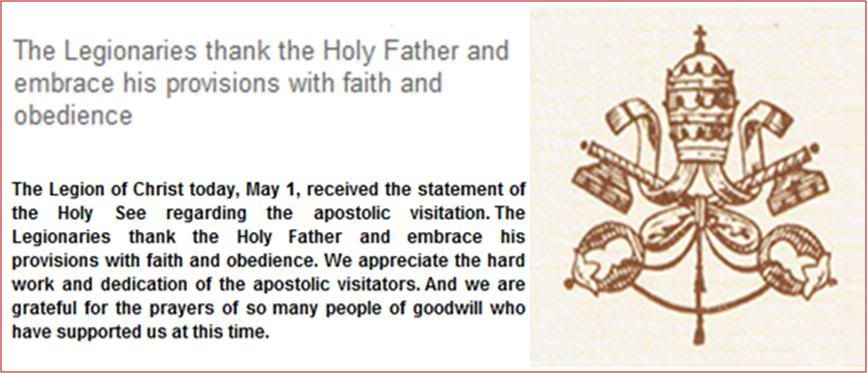 The above heading is followed by the full text of the Vatican communique.
The Legionaries and their lay members deserve our prayers in the process of purification that they are facing, and our best wishes that they may continue their charitable apostolate in a spirit of openness and cordial relations with their local dioceses and parishes.
The above heading is followed by the full text of the Vatican communique.
The Legionaries and their lay members deserve our prayers in the process of purification that they are facing, and our best wishes that they may continue their charitable apostolate in a spirit of openness and cordial relations with their local dioceses and parishes.
I also add a prayer that the various sisterhoods in the United States now under visitation may show the good faith, humility and obedience that the Legionaries have shown.
[Modificato da TERESA BENEDETTA 01/05/2010 22:38] |
| |
 01/05/2010 21:16 01/05/2010 21:16 |
|
| | | OFFLINE | | Post: 20.085
Post: 2.726 | Registrato il: 28/08/2005
Registrato il: 20/01/2009 | Administratore | Utente Veteran | |
|
 POPE VISITS TURIN TOMORROW
POPE VISITS TURIN TOMORROW
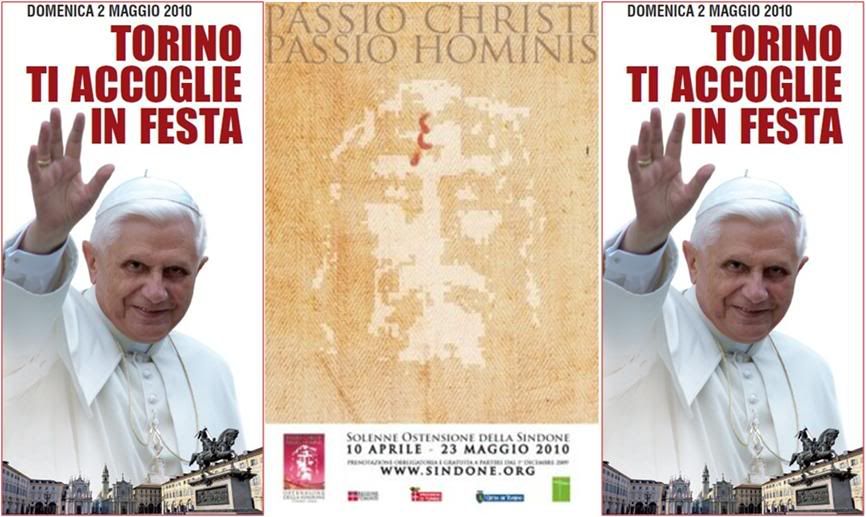 ECCE HOMO!
ECCE HOMO!

May 1, 2010
Hundreds of thousands of pilgrims have flocked to Turin in recent weeks to spend a few minutes in silent meditation before the Holy Shroud, contemplating the image of the tortured body of a crucified man. This fact repeats itself whenever the ancient cloth is exposed to the public and even the most recent Popes have joined devout pilgrims.
It is not the mysterious origin of this image that draws people to it, rather its impressive consistency in so many minute details, to the Gospel story of Christ’s Passion: the wounds, the spilt blood, the gashes of the crown of thorns, the lashes of the whip .
"Behold the man!" Said Pilate presenting Jesus to the crowd.
Behold the man who died on the cross for us, we repeat to ourselves as we stand at first troubled and then wondrous before this, the most concrete image of the Passion.
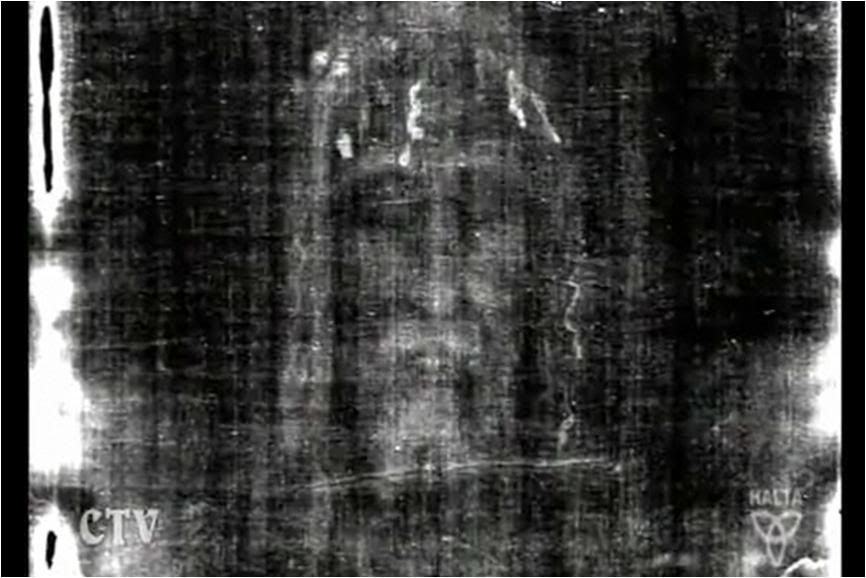
And at the centre the solemn face of the crucifix, a face that corresponds to the oldest dictates of Christian iconography and which in turn confirms and inspires it.
Benedict XVI constantly reminds us; We want to know God and we can know Him through the face of Christ. This is why we love the images that tradition hold to be precious paths to glimpse this face, both in Manoppello and in Turin.
We know that we must look beyond the image, we must desire to behold the Risen One face to face. But we are humbly grateful for this aid to our earthly eyes which helps us to contemplate unconditional love for us, right up to death on the cross.
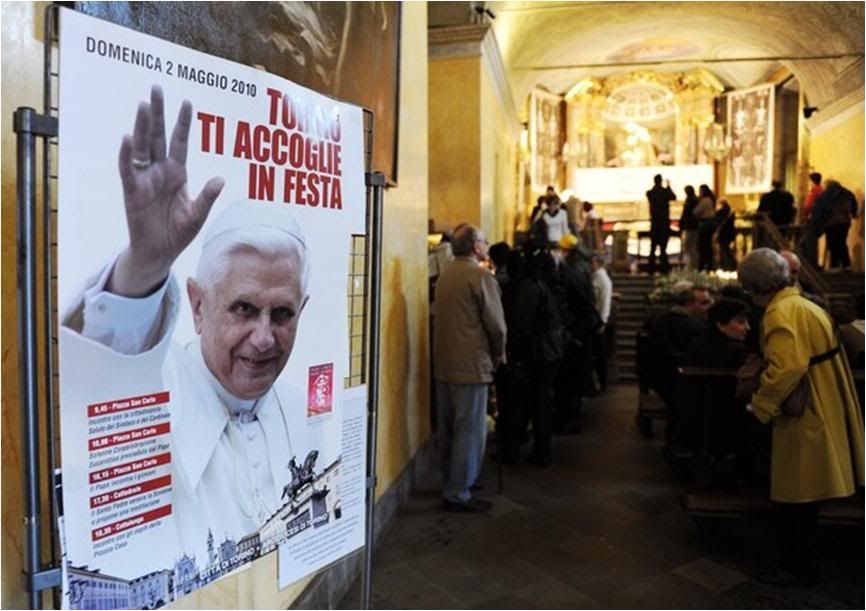
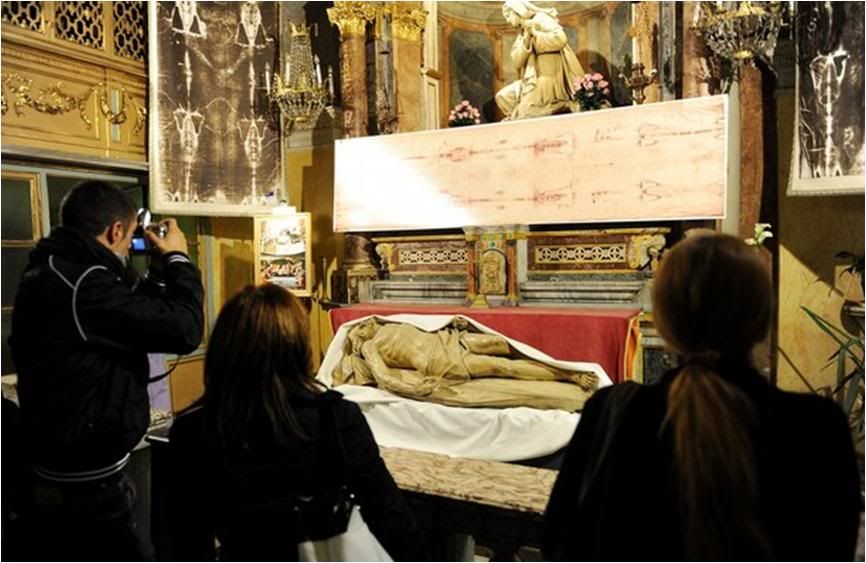 Above, pilgrims crowd one of the ongoing special expositions to give them more information about the Shroud.
Above, pilgrims crowd one of the ongoing special expositions to give them more information about the Shroud.
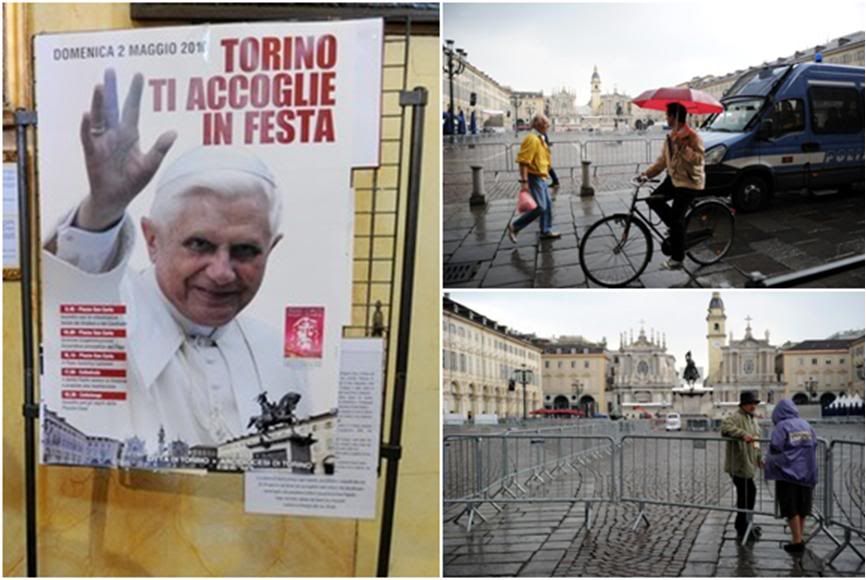 Above, Piazza San Carlo, where the Holy Father will offer Mass tomorrow, was closed off starting today. Below, various views of Turin's largest public square taken earlier.
Above, Piazza San Carlo, where the Holy Father will offer Mass tomorrow, was closed off starting today. Below, various views of Turin's largest public square taken earlier.
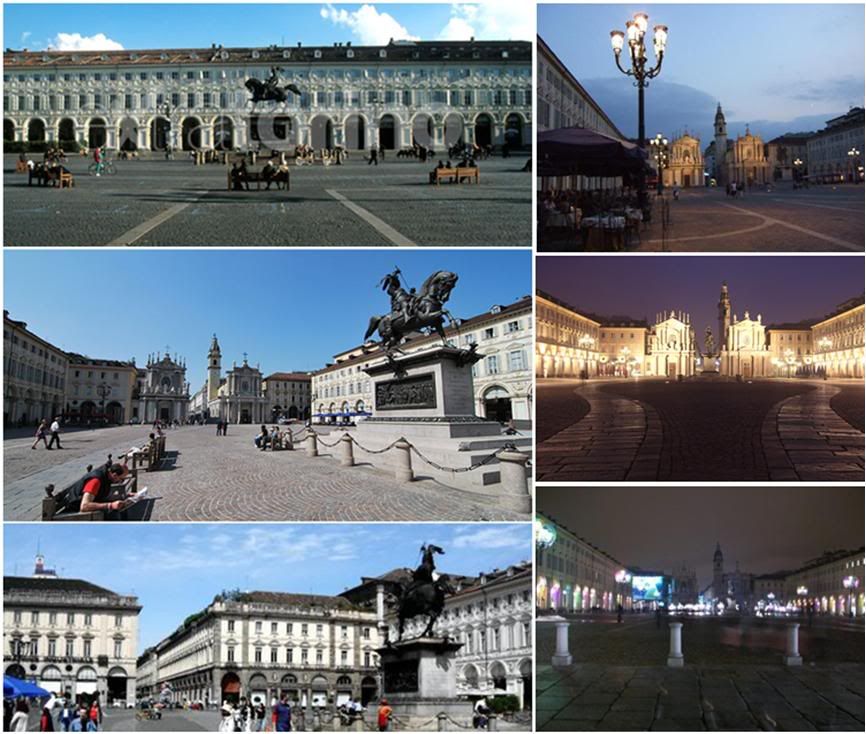 For the first time:
For the first time:
A Pope in Piazza San Carlo
by MANUELA MINUCCI
Translated from

May 1, 2010
TORINO - Www.meteo.it was the most visited site in Turin yesterday by thousands of persons, led by the Organizing Committee for the Holy Shroud Exposition, who want Pope Benedict XVI's visit tomorrow to run as smoothly as possible - without rain.
"The forecast is that the rains will stop around 5 o'clock Sunday morning and will start again around 6 p.m.," said committee president Fiorenzo Alfieri, even as he was giving instructions on his cellphone to volunteers that they should cover all the seats in Piazza San Carlo with plastic sheets to keep them dry for the Pope's Mass tomorrow.
Dealing with rain as well as security is difficult enough - officials even disputed the idea of banning people from bringing umbrellas to Piazza San Carlo - but with the notification from the weather bureau, officials breathed some relief, pointing out that above all, they would not want to spoil the joy of the faithful over the Pope's visit tomorrow.
The Pope's program for his ten-hour pastoral visit to the city is intense, with four public events, in addition to his visit to teh Holy Shroud, and five addresses.
He will be arriving at Caselle airport at 9 a.m. and will have his first encounter with the faithful in Piazza Statuto. He will then take the Popemobile to Piazza San Carlo for the Mass. He will come back to San Carlo in the afternoon to address the diocesan youth after lunching with the bishops of the Piedmont region at the Archbishop's Palace. At 5:30 p.m. he will visit the Holy Shroud. After his private prayer, he will speak on the significance of this singular relic. His last stop will be the Cottolengo, the unique charitable center started by St. Giuseppe Benedetto Cottolengo in the 19th century, which takes care of the sick, the aged, and the disabled.
Attendance at the papal Mass in Piazza San Carol is for ticketholders only. To accommodate those without tickets, six jumbo screens have bee set up - two in the Piazza itself on each side of teh equestrian statue' two in via Roma which leads to teh Piazza, one beside teh Catehdral of Turin, and another at Piazza Castello. The Mass is also being telecast on both national and regional TV.
The city will be on maximum secuurity alert for the visit of teh Pope, who is also a chief of state. In Piazzza Sa CArlo, there will be sharpshooters on the rooftops, dog patrols along the arcades surrounding the square, and hundreds of plainclothesmen who will be in the crowd.
The police will pay particular attnetion toPiazza Madama Cristina where activists of a group called "Sindone No, Ratzinger No' plan to demonstrate.
I found it singular - and of course, very gratifying - that this local newspaper, which serves Turin and Milan, launched an appeal this week for its readers to express their support for the Holy Father. It's a general newspaper, not a religious publication.
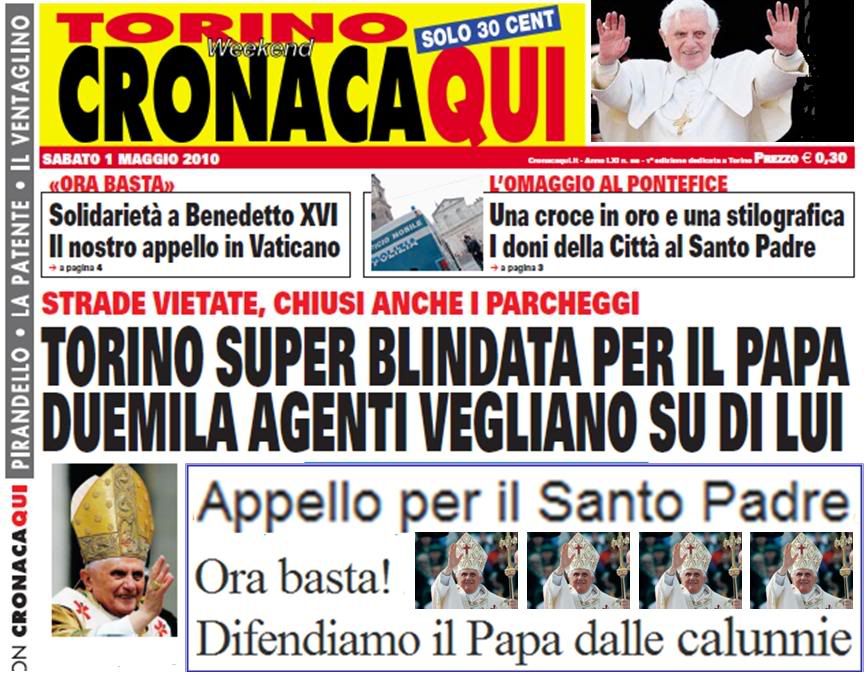 NOTE: I super-imposed the headline for the appeal on the image of the newspaper's Page 1 above the fold today.
NOTE: I super-imposed the headline for the appeal on the image of the newspaper's Page 1 above the fold today.
Here is a translation of the appeal, which directs readers to a Facebook page.
Appeal for the Holy Father
ENOUGH!
LET US DEFEND THE POPE FROM CALUMNIES
Our newspaper is promoting this appeal to express our great solidarity with Pope Benedict XVI.
The Holy Father has been the victim lately of defamatory and exploitative attacks which attempt to portray him as an enabler with respect to one of the most odious crimes - sexual abuse of children.
The Pope represents for us - whether we are believers or not - the moral authority in Italy and in the world who more than any other has defended perennial and shared values like social solidarity, aid to the need, assistance to the sick, peace, and the protection of Christian values.
To accuse the Pope, as newspapers like the New York Times continue to do, means to undermine an institution like the Church along with all the faithful, and we may even say, all Italians.
We hope that this appeal for solidarity with the Pope may be accepted without offending the secular or religious sensitivity of anyone.
THE EDITORS

[Modificato da TERESA BENEDETTA 02/05/2010 02:47] |
| |
|
|
|
|